News
20.01.2026
Understanding new concepts – paving the way for further innovation
What exactly is mediation? Do we fully understand the notions of plurilingualism, pluriculturalism and action-orientation as presented in the CEFRCV? To what extent have we already integrated these concepts into our teaching practice? What are the next steps we can take?
These are some of the questions that were addressed in a two-day ECML Training and consultancy event which was part of the national network meeting of language teachers at upper secondary vocational colleges.
This network meeting takes place every year and this year it was organised by CEBS and the Private University of Education, Diocese of Linz. Together with the two ECML experts, Silvia Melo-Pfeifer and Julia Consuelo Zabala Delgado, we discussed concepts, explored existing materials and developed our own classroom activities. The ideas focused on at the event were not completely new to the participants, as they had been discussed in previous professional development seminars. Therefore, the in-depth insights that this event provided were even more valuable.
Gaining a deeper understanding is absolutely essential since mediation, as well as plurilingual and pluricultural approaches, is anchored in the current curricula and will be even more prominent in the new curricula which are currently being developed. The two experts provided knowledge and material that will be adapted and used by the participants, not only for their own teaching, but also for teacher development activities. The MedVITBox training definitely strengthened the professional competence of everyone who took part.
Belinda Steinhuber and Ute Atzlesberger, Centre for Vocational Languages of the Federal Ministry of Education of Austria
German version:
Neue Konzepte verstehen – den Weg für weitere Innovationen ebnen
Was genau ist Mediation? Haben wir die im CEFRCV vorgestellten Begriffe Mehrsprachigkeit, Multikulturalität und Handlungsorientierung in ihrem vollen Umfang verstanden? Inwieweit haben wir diese Konzepte bereits in unsere Unterrichtspraxis integriert? Welche nächsten Schritte können wir setzen? Dies sind einige der Fragen, die bei einem zweitägigen „Training and consultancy event“ des EFSZ behandelt wurden, das im Rahmen des jährlichen nationalen Netzwerktreffens von Sprachlehrkräften an berufsbildenden Schulen der Sekundarstufe II stattfand.
Das Netzwerktreffen wurde von CEBS und der Privaten Pädagogischen Hochschule der Diözese Linz organisiert. Zusammen mit den beiden EFSZ-Expertinnen Silvia Melo-Pfeifer und Julia Consuelo Zabala Delgado diskutierten wir Konzepte, untersuchten vorhandene Materialien und entwickelten eigene Unterrichtsaktivitäten. Die Themen, auf die sich die Veranstaltung konzentrierte, waren für die Teilnehmerinnen und Teilnehmer nicht völlig neu, da sie bereits in anderen Fortbildungsseminaren behandelt worden waren. Umso wertvoller waren daher die vertiefenden Einblicke, die diese Veranstaltung bot.
Ein tieferes Verständnis ist absolut notwendig, da Mediation sowie mehrsprachige und multikulturelle Ansätze in den aktuellen Lehrplänen verankert sind und in den neuen Lehrplänen, die derzeit entwickelt werden, noch mehr Gewicht erhalten werden. Die beiden Expertinnen stellten Wissen und Materialien zur Verfügung, die von den Teilnehmerinnen und Teilnehmern nicht nur für ihren eigenen Unterricht, sondern auch für Lehrerfortbildungen angepasst und genutzt werden können. Die MedVITBox-Schulung hat die fachliche Kompetenz aller Teilnehmenden definitiv ganz wesentlich gestärkt.
Belinda Steinhuber und Ute Atzlesberger, Center für berufsbezogene Sprachen des österreichischen Bundesministeriums für Bildung
28.11.2025
Roadmap to language sensitivity in Austrian Schools
The European Centre for Modern Languages (ECML), with its 36 member states, develops tools and initiatives to support language learning, multilingualism, and ultimately, a better understanding of each other and democracy in Europe. However, it is difficult to turn Europe-wide expertise into concrete, sustainable change across individual institutions in the member countries. Training events and workshops are valuable parts of this process, but the real goal is to create a snowball effect that reaches whole regions and school systems, ultimately benefiting all learners.
One of the ECML’s key innovations in response to this challenge is the Training and Consultancy programme, in which a group of experts visits a specific country to introduce a selected project or tool to stakeholders in the school system, providing support for its local implementation.
Austria provides an illustrative case of how the ECML’s Roadmap-Tool to support the language(s) of schooling can be embedded in national school development initiatives like the ÖSZ’s project “Language sensitive School Development” that started in 2024 on behalf of the Austrian Ministry of Education. The project began with a Training & Consultancy event in November 2024 for the first cycle of lower secondary schools from the regions Styria, Lower Austria, Carinthia and has now entered its second cycle with a new group of schools from the regions of Upper Austria, Salzburg and Burgenland.
A tool for whole-school reflection
The Roadmap is a web-based, user-friendly and customized self-assessment tool to foster a whole-scale school-development, through a focus on support for the languages of schooling. The tool allows five stakeholder groups ─ school principals, teachers, school staff, learners and parents, all of them contributing to successful language learning at school – to participate through online questionnaires in the following 9 areas:
- Awareness of the linguistic dimension (staff as language models)
- Development of linguistic knowledge and skills (varied language registers)
- Metalinguistic awareness (language in subject learning)
- Role of languages in learning (multilingualism, language connections)
- Attitudes towards languages (visibility and appreciation of linguistic diversity)
- Informal language learning (creating opportunities)
- Language resources in the school (knowledge of the languages of students, families and staff)
- Professional development (support for teachers)
- Orientation for newly arrived students and families (communication, translation of documents)
The Roadmap thus encourages schools to consider how all languages present in the school interact with teaching, learning and participation. Importantly, it highlights the need for structural support: individual teacher enthusiasm can spark progress, but sustainable change requires a coordinated whole-school strategy.
Austria’s approach: professionalisation through networking and support
In Austria, genuine school improvement is only possible when multiple layers work together: the ECML sets the scene and guides the participating schools through the self-assessment process using the Roadmap-Tool in the first cycle. The national partners – the Teacher Training Colleges (Pädagogische Hochschulen), regional Education Authorities (Bildungsdirektionen), school quality managers, and the Austrian Centre for Language Competence (ÖSZ) support the process and translate the results into local practice.
The Austrian Roadmap cycles bring together six to seven schools from several regions. The cycle begins with a kick-off meeting, during which each school uses the Roadmap to evaluate its current situation (IST-Stand). The results then become the foundation for planning tailored measures to strengthen language-sensitive education. The cycle continues with an online follow-up session focusing on impulses, progress, and exchange. This is followed by hands-on development work in each participating school, culminating in a final conference that consolidates both the network and the development work. Throughout the process, Teacher Training Colleges and the ÖSZ offer pedagogical support and expertise.
Insights from the first cycle: motivation, momentum and small wins
The first Austrian School team-cycle began in November 2024, when seven school teams from Styria, Lower Austria and Carinthia met in Graz for the official kick-off. The event was supported by the ECML’s Roadmap expert Selin Öndül (Zurich), who emphasised:
“Language acquisition is the most relevant aspect of school-based learning. It is the task of every school with diverse language backgrounds to get the most from their educational setting for their students. Not only the individual teachers' efforts but also a systemic, well-planned whole-school strategy is necessary.”
This message resonated strongly with the participating schools. Feedback from head teachers highlighted how the event sparked immediate action:
“Yes, absolutely! I was already in contact with my school yesterday and with a school development team in Lower Austria. We have already discussed the next steps.”
(Head teacher, secondary school)
Teachers also pointed to the concrete, human aspects of multilingual awareness:
“I really liked the small things ─ letting children count in their first languages, valuing their home languages, making them visible. Not insisting on German at all times but seeing the children and their languages so they stay motivated.”
(Head teacher, secondary school)
These reflections reveal an important aspect: language-sensitive education is not only a theoretical framework but a matter of daily interaction, visibility and respect.
From reflection to action: the follow-up meetings
First follow-up (April 2025)
By the time the first follow-up meeting took place in April 2025, five school teams were still actively engaged. They were joined by representatives from three Teacher Training Colleges as well as school quality managers from Carinthia and Lower Austria. Key achievements included:
- implementation of the Roadmap assessment
- recognition of language-sensitive education as a development priority
- formation of school teams to drive internal processes
However, challenges emerged as well ─ especially the difficulty of reaching all teachers in a school. Experts reassured teams that change takes time and encouraged them to celebrate small steps. Their advice emphasised:
- multilingualism as a resource
- involving parents
- teaching linguistic “operators” (e.g. describe, compare, justify) consciously and repeatedly
- interpreting incremental improvement as success
Teams also began planning further actions: motivating the entire teaching staff, establishing coordinating groups, observing each other’s classes and checking textbooks for language-sensitive design.
Second follow-up (Melk, November 2025)
The second follow-up in November 2025 focused on methods and didactics. School teams exchanged experiences, tested tasks and explored classroom strategies. By this time, the Roadmap process had started to generate the intended snowball effect: a second cycle was already under way.
The growing impact: new cycles and broader reach
In June 2025, the ÖSZ started in Linz a second cycle with eight schools from Upper Austria, Salzburg and Burgenland and again with the ECML’s Roadmap expert Selin Öndül. Their first follow-up took place on 25 November and will be followed by a second in spring 2026. A third cycle is planned for 2027, involving Tyrol and Vorarlberg.
As Selin Öndül summarised after one of the Austrian events:
“Austrian schools are on the way to greater success for all students.”
Anna Gazdik, Österreichisches Sprachen-Kompetenz-Zentrum
Photo credit: Anna Pirato
08.10.2025
National Training Workshop “Using ICT in support of language teaching and learning (ICT-REV)” (1-2 October 2025, Vienna, Austria)
The national training workshop “Using ICT in support of language teaching and learning (ICT-REV)” took place on October 1–2, 2025 at the Department of Romance Studies, University of Vienna. It targeted teacher educators in Romance languages as well as selected French, Italian, and Spanish teachers acting as multipliers.
The ICT-REV expert team (Pauline Ernest, Joe Hopkins, and Ursula Stickler) provided participants with practical approaches to effectively integrating digital and AI-based tools into language teaching. Core topics included exploring available ICT technologies, critically reflecting on their pedagogical value, and developing hands-on learning activities. The workshop also promoted dialogue between university teacher trainers and secondary school practitioners.
Its main objective was to encourage participants to disseminate their acquired knowledge and skills in teaching, mentoring, or professional development activities. Supported by the European Centre of Modern Languages (ECML), the workshop followed a blended model combining pre-tasks, two intensive on-site days, and follow-up cascading activities. By fostering peer learning and reflection, it aimed to ensure sustainable professional growth and the efficient use of ICT in language education.
German version:
Der Workshop „Using ICT in support of language teaching and learning (ICT-REV)“ fand am 1. und 2. Oktober 2025 am Institut für Romanistik der Universität Wien statt. Zielgruppe waren Lehrende der Fachdidaktik romanischer Sprachen sowie ausgewählte Französisch-, Italienisch- und Spanischlehrkräfte.
Ein Expert*innenteam aus dem ICT-REV-Projekt (Pauline Ernest, Joe Hopkins und Ursula Stickler) stellte konkrete Möglichkeiten vor, wie digitale und KI-basierte Tools pädagogisch sinnvoll im Fremdsprachenunterricht eingesetzt werden können. Themenschwerpunkte waren das Kennenlernen moderner ICT-Technologien, die kritische Reflexion ihres didaktischen Mehrwerts sowie die Entwicklung praxisnaher Lernaktivitäten. Darüber hinaus wurde der Austausch zwischen Universitätsdidaktiker*innen und schulischen Multiplikator*innen gefördert.
Das Ziel war, die Teilnehmenden zu befähigen, die erworbenen Kenntnisse weiterzugeben – etwa in Lehrveranstaltungen, beim Mentoring von Studierenden oder in schulischen Fortbildungen. Der Workshop war Teil einer europäischen Initiative, kofinanziert vom European Centre of Modern Languages (ECML), und bot durch Vor- und Nachbereitungsaufgaben, intensive Arbeitseinheiten sowie Peer-Learning nachhaltige professionelle Weiterbildung.
Local coordinators: Robert Riegler & Marie-Luise Volgger-Bahensky
ECML project website: Use of ICT in support of language teaching and learning, ECML-EC cooperation agreement 2025 "Innovative methodologies and assessment in language learning"

03.10.2025
"Language education at the heart of democracy" exhibition launched during PACE
 From 29 September to 10 October 2025, the Palais de l’Europe in Strasbourg hosted the exhibition “Language education at the heart of democracy”, organised by the European Centre for Modern Languages (ECML) and the Language Policy Programme. Coinciding with the autumn session of the Parliamentary Assembly of the Council of Europe (PACE), the exhibition highlighted how language education strengthens democracy, social cohesion, and intercultural understanding.
From 29 September to 10 October 2025, the Palais de l’Europe in Strasbourg hosted the exhibition “Language education at the heart of democracy”, organised by the European Centre for Modern Languages (ECML) and the Language Policy Programme. Coinciding with the autumn session of the Parliamentary Assembly of the Council of Europe (PACE), the exhibition highlighted how language education strengthens democracy, social cohesion, and intercultural understanding.
The inauguration on 30 September was opened by the Permanent Representative of Austria to the Council of Europe, Aloisia Wörgetter, and attended by an audience of over 100 parliamentarians and other guests. Speakers included PACE Vice-President Andries Gryffroy (Chair of the Belgian Delegation), Martin Graf (Chair of the Austrian Delegation) and Matthias von Gehlen (Vice-Chair of the ECML Governing Board).
ECML Director Sarah Breslin underlined the central role of languages in both education and democracy:
“Quality language education lies at the heart of democracy. Languages are linked to our identities and to our hearts. And through languages, we can touch the hearts of others.”
The exhibition’s panels developed this message through six key concepts – collaboration, digitalisation, motivation, celebration, inclusion and cohesion – illustrated with examples from the work of the ECML and the Council’s Language Policy Programme.
The exhibition followed on from the 25th European Day of Languages, where Secretary General Alain Berset had highlighted the significance of multilingual education:
“The teaching and learning of multiple languages is not a cultural luxury, but a political necessity – a vital means of bringing the European ideal to life and reinforcing the pluralistic, inclusive, and forward-looking values at the heart of the European project.”
A follow-up meeting hosted by the Austrian Representation also brought together 19 Permanent Representatives and Deputies. Discussions with the ECML Director focused on a wide range of issues, including regional and minority languages, dialects, and the integration of migrant children. The strong turnout reflected the interest in language education as a driver of democratic resilience and social cohesion.
The events further enhanced the visibility of the Graz Centre among political stakeholders, while emphasising the increasingly important role language education has to play in fostering and sustaining inclusive and democratic societies across today’s Europe.
https://www.ecml.at/en/Events/ECML-exhibition-in-Strasbourg
01.07.2025
Austrian schools are on the way to greater success for all students
Language acquisition is the most relevant aspect of school-based learning. It is the task of every school with diverse language backgrounds to get the most from their educational setting for their students. Not only the individual teachers' efforts but also a systemic, well-planned whole-school strategy is necessary. During the event, school-teams (head teacher and one or two teachers) from the provinces of Oberösterreich, Salzburg and Burgenland with the help of professional support reflected on the possibilities to further develop their schools. They were introduced to the data-based school development tool, Roadmap. They planned the next steps and could network with each other and also with school consultants from their region.
Selin Öndül, team member of the ECML Training and consultancy activity “A roadmap for schools to support the language(s) of schooling“
16.09.2025
Exhibition: Language Education at the Heart of Democracy

From 29 September to 3 October 2025, the Education Department of the Council of Europe will showcase how language education strengthens democracy, social cohesion, and intercultural understanding through the work of its Language Policy Programme in Strasbourg and its European Centre for Modern Languages (ECML) in Graz.
Hosted in the Lobby of the Assembly at the Palais de l’Europe (Strasbourg) and supported by the Permanent Representation of Austria to the Council of Europe, the exhibition entitled “Language Education at the Heart of Democracy” will present inspiring projects, innovative resources and real-life stories illustrating the transformative power of language education.
The exhibition highlights the Council of Europe’s pioneering role in placing language education at the core of its mission to foster democracy, human rights and cultural diversity, by linking policy development, research, teacher education and classroom practice in support of inclusive and democratic societies.
When: 29 September – 3 October 2025
Where: Palais de l’Europe (Lobby of the Assembly), Avenue de l’Europe, Strasbourg
Exhibition poster
Exhibition flyer
See also: Council of Europe Education Department, 29 September 2025
03.07.2025
The ECML’s remarkable contribution towards a culture of democracy in Europe
A poster presentation by E CML expert Catherine Carré-Karlinger at the international conference “Articulations of Democracy Education” highlighted the Centre’s role and its vast pool of resources promoting innovative language education for a culture of democracy. The conference took place on 15 and 16 May 2025 in Vienna and was organised by the University of Vienna.
CML expert Catherine Carré-Karlinger at the international conference “Articulations of Democracy Education” highlighted the Centre’s role and its vast pool of resources promoting innovative language education for a culture of democracy. The conference took place on 15 and 16 May 2025 in Vienna and was organised by the University of Vienna.
The aim of the conference was to scrutinise the relationship between language, democracy and education from an interdisciplinary perspective. Conceptual issues were analysed in a series of stimulating presentations. Current research findings were presented on panels and in workshops and pedagogical scenarios for promoting a culture of democracy through language and political education were discussed.
Democracy needs to be learnt, shaped and cultivated: it is a central pedagogical task. Consequently, schools play a key role as an institutionalised place of learning where individual life plans and social requirements are to be harmonised. Schools have the potential to enable all children and young people to experience democracy as a way of life at close quarters. This in turn requires the consistent professionalisation of all educational staff. The importance of an interdisciplinary approach between language and political education in our multilingual society was emphasised several times at the conference. In this respect, the ECML is proving to be an important point of reference.
Find out more at:
https://www.ecml.at/en/ECML-Programme/Poster-Sprachenbildung
Author: Catherine Carré-Karlinger
30.05.2016
Summary of the Workshop “Romani as a minority language in formal education” (Austria)
Moderators: Barbara Schrammel-Leber and Jelena Filipović
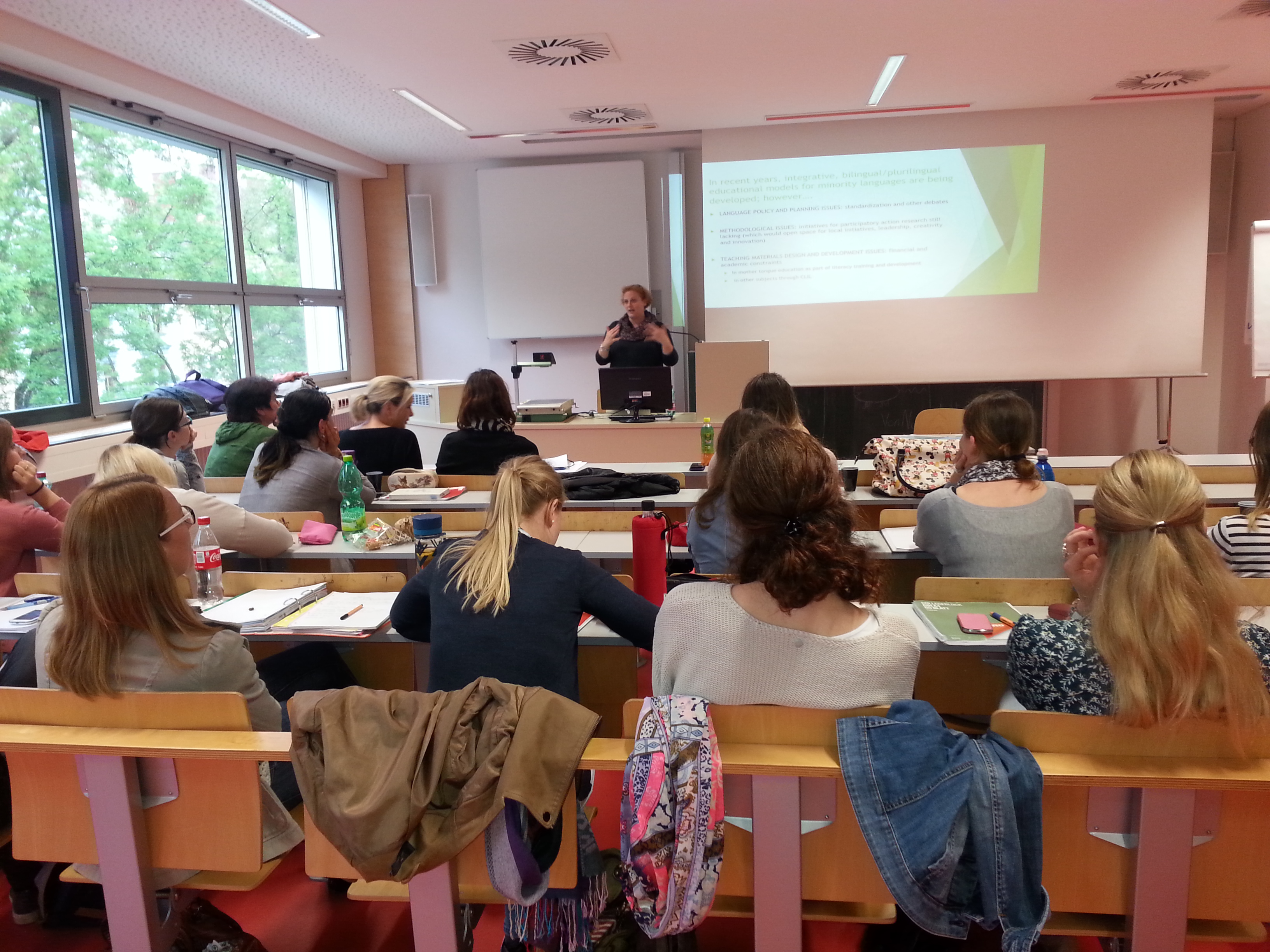 The language and culture of the Roma still today is a field that is hardly touched upon in teacher training in Austria. Austria has both an autochthonous and an allochthonous Roma minority, although Roma children in Austrian schools are often not recognised as such.
The language and culture of the Roma still today is a field that is hardly touched upon in teacher training in Austria. Austria has both an autochthonous and an allochthonous Roma minority, although Roma children in Austrian schools are often not recognised as such.
This workshop brought together 25 newly qualified teachers of primary and secondary schools in Austria - many of them teaching German as a second language to children with a migrant background – and future teachers from the University College of Teacher Education Styria.
The event provided an overview of the different groups of Roma living in Austria and about the history and structure of Romani as a European minority language that has only very recently been codified. It also served to introduce the outcomes of the Qualirom project, both the teaching materials as well as the teacher training module developed in the project, to Austrian teacher trainers, teachers and students. In addition, the event provided the participants with an overview of the models and methods for the integration of minority languages into formal schooling, a topic that is highly relevant for Romani as well as other European regional, minority and migrant languages.
*****
The QualiRom initiative (2011-2013), carried out under the European Commission’s Key Actions 2 programme, made extensive use of the Council of Europe’s Curriculum Framework for Romani (CFR) and two European Language Portfolio models. The initiative sought to promote the inclusion of Romani in education systems and to contribute to the integration of speakers of the language by improving the educational situation of Roma children, raising the self-esteem of Romani speakers, contributing to the emancipation of people with a Roma background, and promoting equality of opportunity as a basic human right.
Training and consultancy events offered by the ECML, based on the QualiRom results, aim to provide participants from interested member states with:
a. basic information about Romani as a European minority language (language history, language structure, sociolinguistics, dialectology, language education policies);
b. basic guidelines about possible ways of including Romani as a minority language into mainstream classrooms; and
c. introductory training in CLIL (content and language integrated learning) and its relevance for Romani teaching.
The activities also make use of an extensive databank of teaching and learning materials for teachers of Romani (http://qualirom.uni-graz.at).
Websites:
Photo credit: Barbara Schrammel-Leber
11.09.2015
Just released: ÖSZ Sprachbox 2/2015
This issue focuses on the European Day of Languages on 26 September, refugee children in Austrian schools, the European Language Label, language sensitive subject teaching, tips for learning English easily, minority education in the province of Burgenland, PUMA - a game supporting multilingualism in the everyday life of children, and the fair Interpädagogica.
ÖSZ-Sprachbox (only in German)
*****
The Austrian Centre for Language Competence (ÖSZ) is the national Contact Point for the European Centre for Modern Languages (ECML) in Austria.
Web pages dedicated to the Austrian expertise in the ECML work
20.08.2024
In the spotlight: Dagmar Heindler
On the occasion of the 75th Anniversary of the Council of Europe", 75 women, whose work significantly shaped the Council of Europe, were honoured at an official ceremony in the Palais de l’Europe in June.
Dagmar Heindler, former director of the Österreichisches Sprachen-Kompetenzzentrum (ÖSZ) – the Austrian Language Competence Centre who played an integral role in the establishment of the European Centre for Modern Languages (ECML) in Graz some 30 years ago, was among those whose achievements were honoured. In addition to her involvement with the ECML, she was the Austrian representative in the Council of Europe’s Modern Languages Project Group which was formed in the mid-1970s to support and improve the learning and teaching of modern languages in Member States. Following the creation of the ECML as an Enlarged Partial Agreement of the Council of Europe, initially with 8 Member States, she was elected chairperson of the Governing board, a position she held for 10 years, assuring stability and continuity in the Centre’s development. Today the ECML which also celebrates its 30th anniversary has grown to 36 members.
More information on the Council of Europe’s website.
In a recent interview with Anna Gazdik (Österreichisches Sprachen-Kompetenzzentrum, ÖSZ), Dagmar Heindler talks about her strong commitment in the Council of Europe's language policy work and the creation of the ECML. The article is available in German.
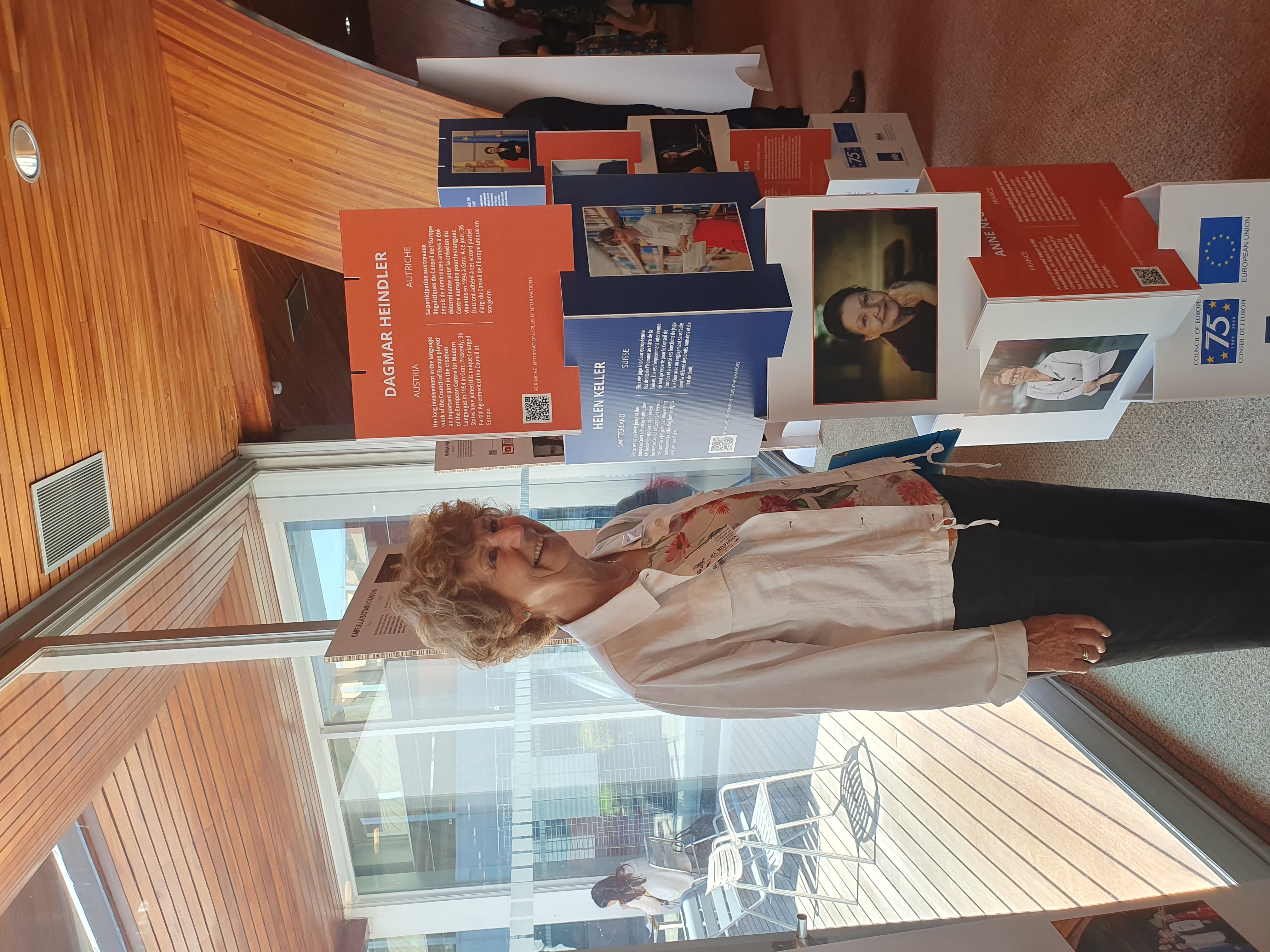
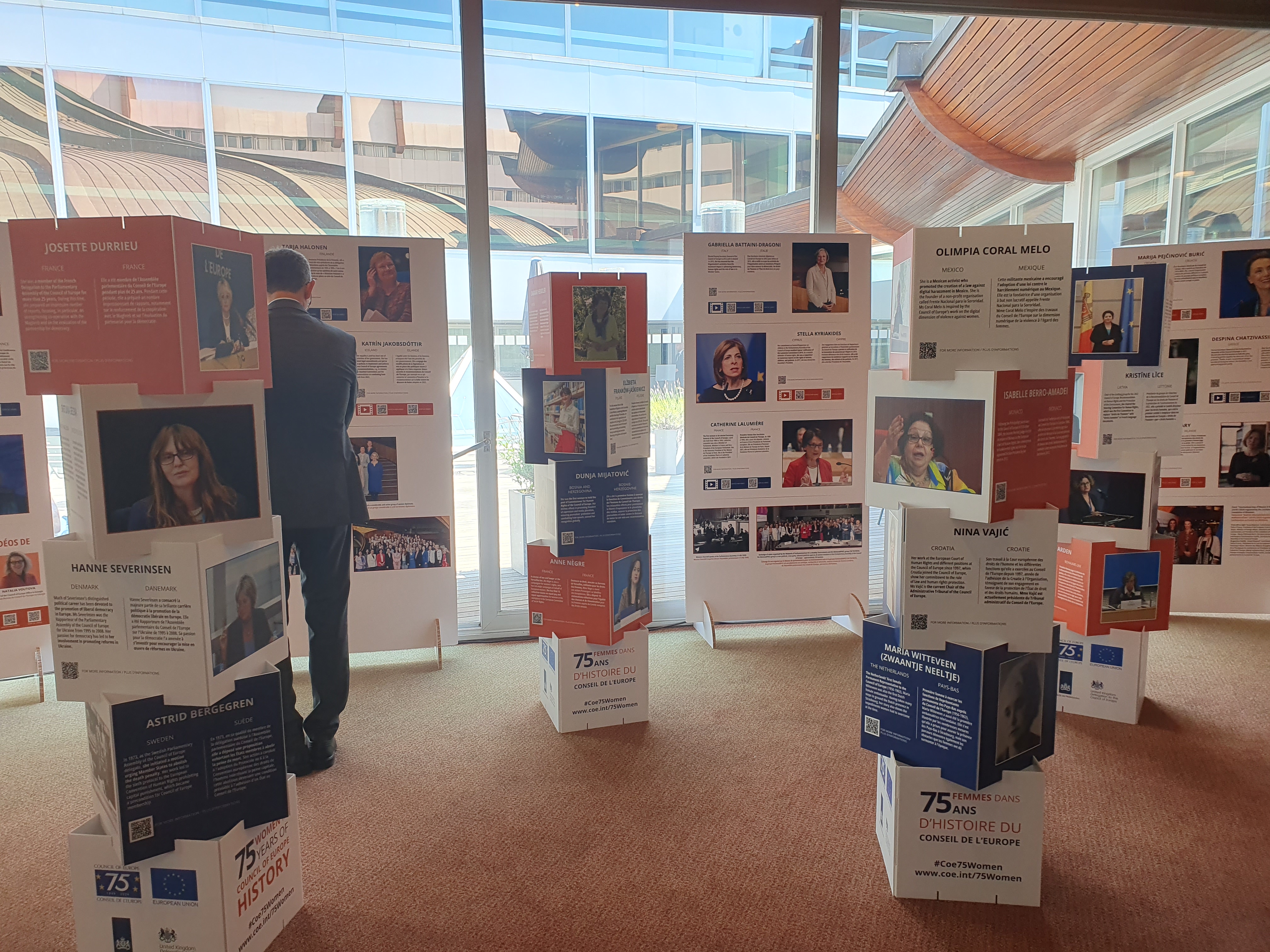
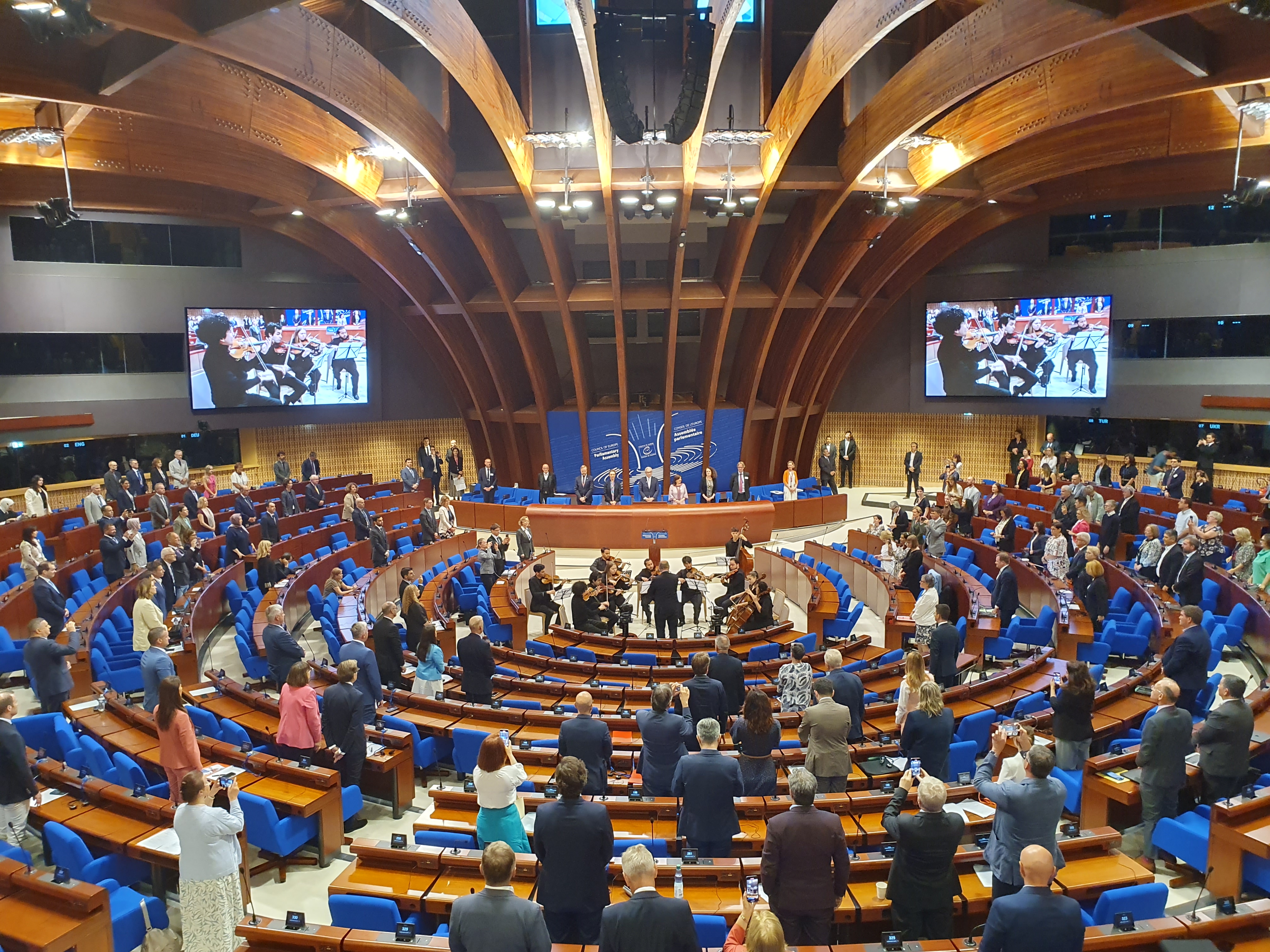
Photos: © Gerhard Peinsipp
28.03.2023
European Language Gazette #63: enjoy the latest issue!
The European Language Gazette, the ECML's e-newsletter, provides up-to-date news about the ECML (events, projects, resources) and other relevant sectors of the Council of Europe as well as of our partners. It focuses on national developments in the field of language education in the member states and beyond.
Enjoy the latest issue: English – French
European Language Gazette no. 63 (January – March 2023)
Table of contents:
“A new Council of Europe Recommendation on language education: the importance of teacher education”
ECML programme developments 2020-2023 – “Inspiring innovation in language education: changing contexts, evolving competences”
- Save the dates!
- Launch event of the ECML Call for proposals for the 2024-27 programme, 15 May 2023
- ECML Summer Academy, Graz, 3-7 July 2023
- “Enhancing language education in cross-border vocational education education (initial/in-service)”: a critical topic all over Europe
ECML national support event
- “Diving into deep learning” – Vlaamse CLIL-studiedag (Brussels, Belgium, 6 March 2023)
Recent ECML resources
- Selected ECML flyers in German
- Selection of ECML resources and projects in German
- Publication translations
- Inventory of ICT tools and OERs: discover the latest resources!
Publications quoting the work of the ECML
- Related ECML work on language awareness, the language of schooling, subject classes, mediation, learning environments
European Day of Languages: EDL t-shirt contest
- EDL t-shirt 2023
- EDL t-shirt contest 2024
Training and consultancy activities
- Launch of a series of 48 language education workshops in member states
National developments
- Austria: competition for the European Language Label in Austria 2023
- France
- LISEO highlights the work and resources of the ECML and national language policies in Europe
- World Language Barometer 2022 – launch of the 4th edition
- Germany: MitSprache Deutsch4U - a programme for non-profit organisations to foster learning environments where diversity flourishes
- Ireland
- Erasmus+ School Education: The impact of mobility projects on the professional development of staff
- #ThinkLanguages Week 2023 (27 November – 1 December 2023)
- Canada: 2020-2021 Annual Report of the Official Languages and Bilingualism Institute (OLBI)
Professional Network Forum of the ECML
- Forthcoming events of the Forum members
- Eaquals webinar series 2023
- ECSPM: International Symposium “The social role of higher education: Developing the civil society’s awareness and impacting policies on the role of multilingualism in education” (Strasbourg, France, 22-24 March 2023)
- 10th EDiLiC conference (University of Copenhagen, Denmark, 28-30 June 2023)
- ICC – the International Language Association: conference, articles, new YouTube channel
- “Future of languages”: FIPLV Nordic-Baltic Region Conference (Reykjavik, Iceland, 8-9 June 2023)
In memoriam – Evangelia Moussouri and Tony Fitzpatrick
Council of Europe developments
- Towards the 26th session of the Council of Europe Standing Conference of Ministers of Education: a series of consultations
- CEFR online workshop series
- The European Charter for Regional or Minority Languages
- The European Charter for Regional or Minority Languages is celebrating its 25th anniversary
- Recent reports: Netherlands, Sweden
- Council of Europe online bookshop: recent publications
News from other organisations
- International Colloquium “Plurensa-2023: Multilingualism/plurilingualism, teaching and learning, complexity and integrity: epistemological, pedagogical and political perspectives” (7-10 June 2023, Montpellier, France)
- EU: European Year of Skills 2023, recent EU resources
- OECD: recent resources
- International Mother Language Day – UNESCO event “Multilingual education – a necessity to transform education” (21 February 2023)
- Global Citizenship and Multilingual Competences: new teaching module
- The European Wergeland Centre: recent resources
- New handbook “31 basic activities”
- “How does Artificial Intelligence influence the way teachers teach and students learn to live in a democracy?” – Webinar recorded on 7 February 2023
- Journal of International Mobility: special issue on Interculturality, intercultural skills and mobility in adult education – Call for paper until 28 April 2023
- Journal Education Sciences: special issue on Multiculturalism in higher education: current trends, challenges, and practices – Call for papers until 31 July 2023
- Babylonia, the Swiss Journal of Language Education: latest issue
Quick links
30.08.2022
IDT Conference “mit.sprache.teil.haben” (Vienna, Austria, 15-20 August 2022): ECML contributions
From 15-20 August 2022, 2 800 participants from 110 countries met at the University of Vienna for the conference entitled “mit.sprache.teil.haben”. The host associations ÖDaF (Austrian Association for German as a Foreign and Second Language) and IDV (International Association of Teachers of German), in close cooperation with the Goethe-Institut, offered a rich programme to stimulate discussion on both academic and practical aspects of teaching and learning German.
In her video greeting at the opening of the IDT, the ECML director Sarah Breslin responded to the conference motto on the role of languages for active participation in society – (mit.sprache.teil.haben) – by emphasising the vital role of plurilingualism and intercultural competences for a democratic culture in Europe.
The initiatives and resources offered by the ECML to teachers and other language professionals were presented at a well-attended ECML information stand. On the opening day itself, two members of the ECML Governing Board were welcomed there: Claudia Petiti from Switzerland and Steinar Nybøle from Norway.
Two ECML events were offered as part of the conference programme: a presentation of an ECML project: “CLIL in German: Transitions between educational levels” offered by Petra Daryai-Hansen, Beate Lindemann and Aina Būdvytytė (see the report of this team below), and a workshop on the ECML resource “A roadmap for schools to support the language(s) of schooling”. Participants highlighted the practical relevance and innovative potential of the presented ECML approaches for innovative language education in their feedback.
The ECML was also present at a book presentation organised by the Vienna Chamber of Labour. The new publication “Fokus Mehrsprachigkeit. 14 Thesen zu Sprache und Sprachenpolitik. Beiträge aus Österreich und Europa” (Focus Multilingualism. 14 theses on language and language policy. Contributions from Austria and Europe) exemplifies how multilingualism can strengthen the sustainability of a society. It includes an article by Susanna Slivensky (ECML) entitled “Mobilität und Sprachenlernen für Demokratie in Europa. Perspektiven des Europäischen Fremdsprachenzentrums des Europarates” (Mobility and Language Learning for Democracy in Europe. Perspectives of the European Centre for Foreign Languages of the Council of Europe). This is complemented by a contribution from the perspective of the European Commission/Kristina Cunningham and Claudia Kropf: “Vom Binnenmarkt zum Europäischen Bildungsraum: Mehrsprachigkeit und Mobilität als Motor für Integration, Wachstum und Beschäftigung in der Europäischen Union” (From the Single Market to the European Education Area: Multilingualism and Mobility as an Engine for Integration, Growth and Employment in the European Union).
Further encouraging language policy priorities were set at the IDT closing event, with a plenary lecture by Hans-Jürgen Krumm on the topic of “Sprachengerechtigkeit” (language justice) and the “Wiener Thesen zur Sprachenpolitik – 11+1 Forderungen zur Stärkung gesellschaftlicher Teilhabe” (Vienna Theses on Language Policy – 11+1 Demands for Strengthening Social Participation). Set against the backdrop of the new recommendation of the Council of Europe's Committee of Ministers on the importance of plurilingual and intercultural education, these are welcome synergies to strengthen innovation in language education.
“CLIL in languages other than English – Successful transitions between educational stages”: report of the ECML team
The ECML project “CLIL in languages other than English – Successful transitions between educational stages” was presented at the IDT in Vienna on Thursday, 18 August 2022. First, main results of a comprehensive questionnaire survey, which was answered by 38 experts from 29 countries, were put forward. The results show that CLIL is only found to a very limited extent in languages other than English in the European countries. Furthermore, CLIL is almost never linked to plurilingual education and transitions between levels of education are given very little attention. Then, some key results from two of the eight working groups of the project were presented. On the one hand, an example from the working group for curricula: the renewed Lithuanian curriculum for DaF, taking transitions between educational levels in CLILiG into account. On the other hand, some main points of the working group for teacher education were presented, pointing out that a further development of CLILiG initiatives in teacher education is necessary, that CLIL LOTE should be integrated into teacher education for all school subjects and that an intensive collaboration between teachers and teacher students for non-language and language subjects at different educational levels is necessary.

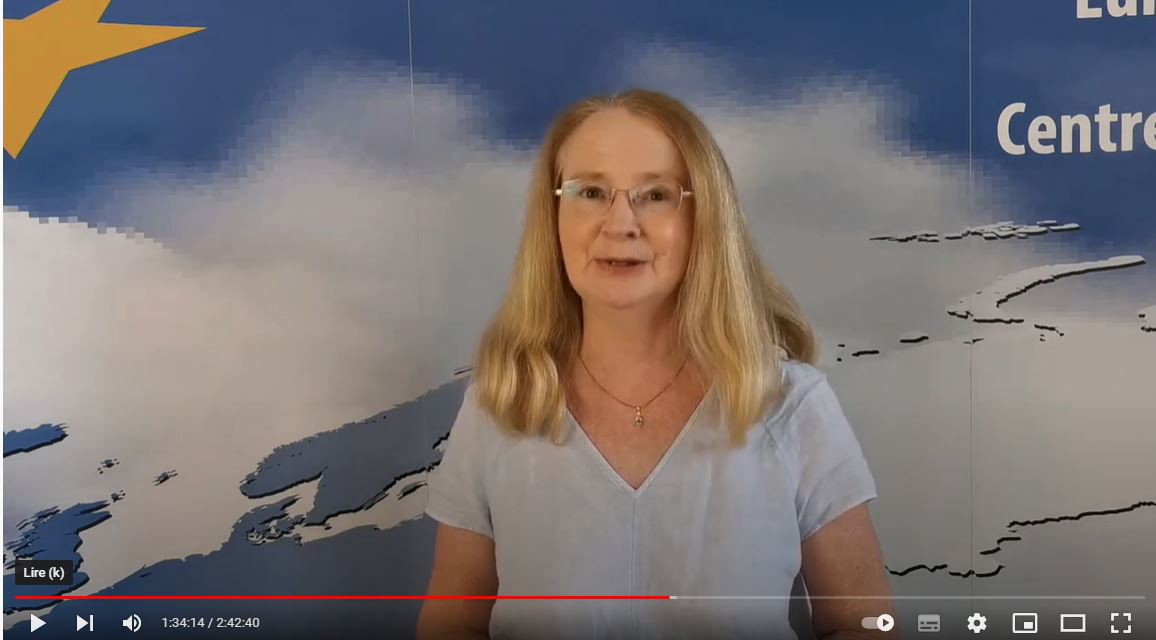
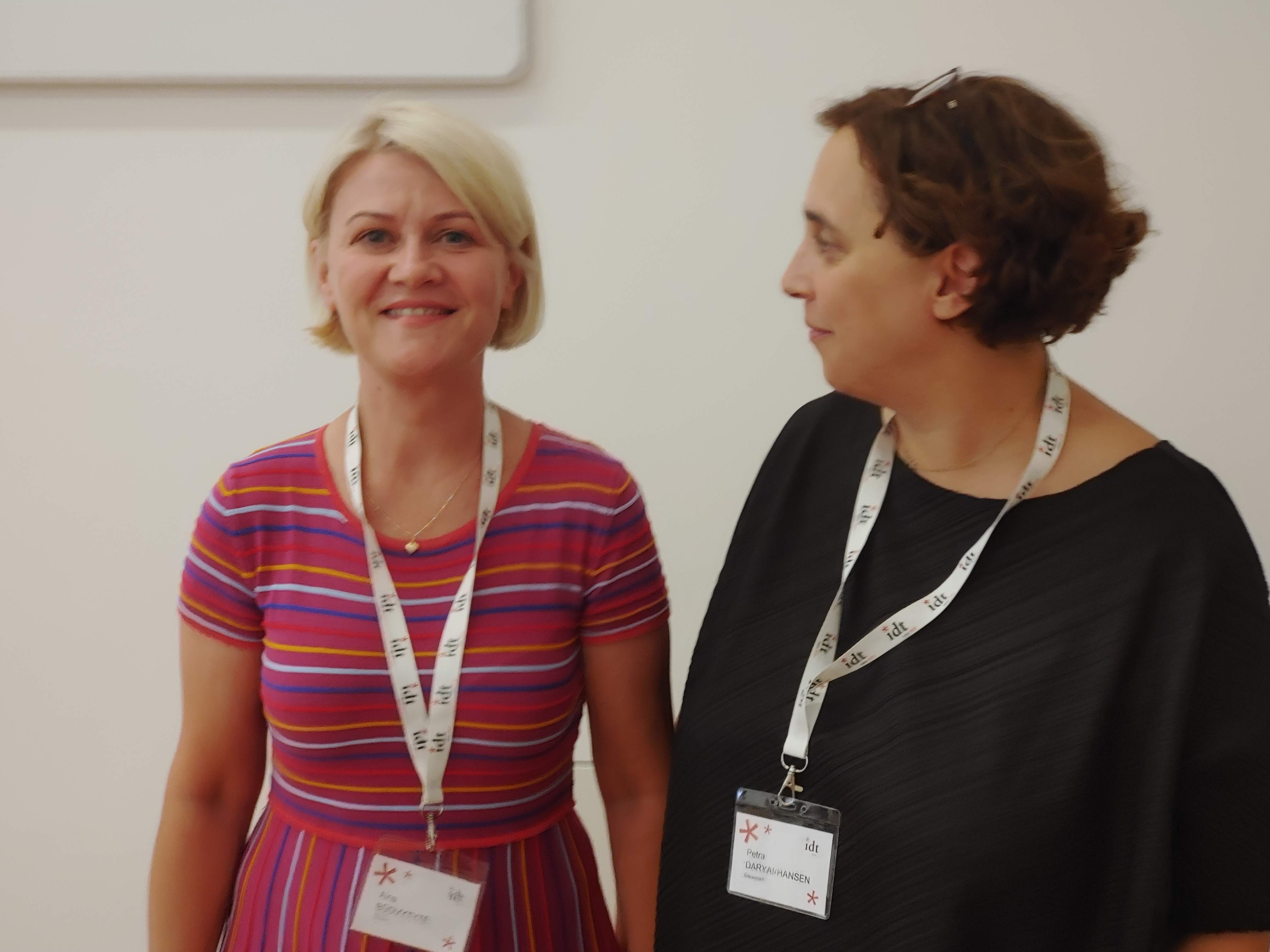
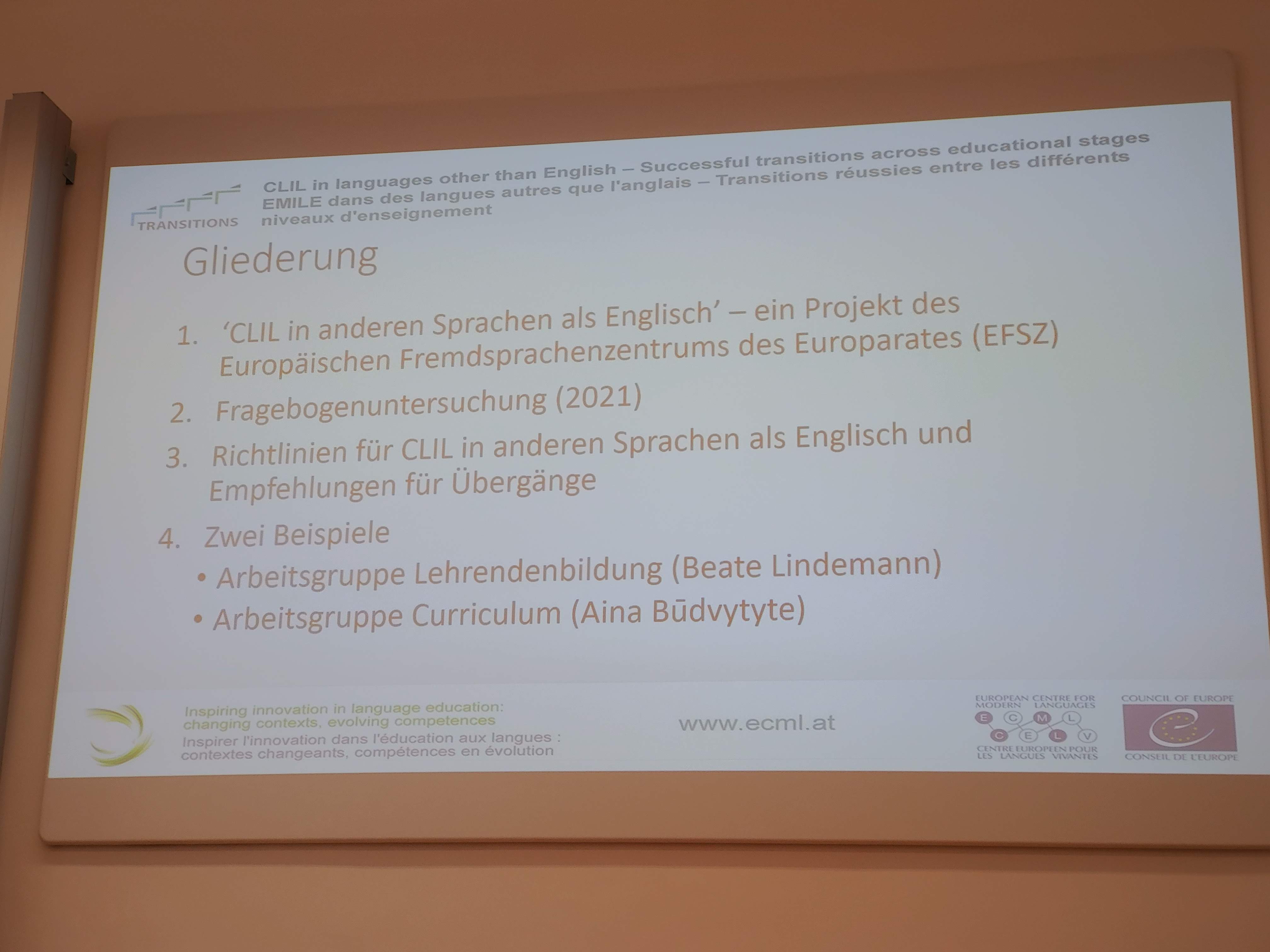
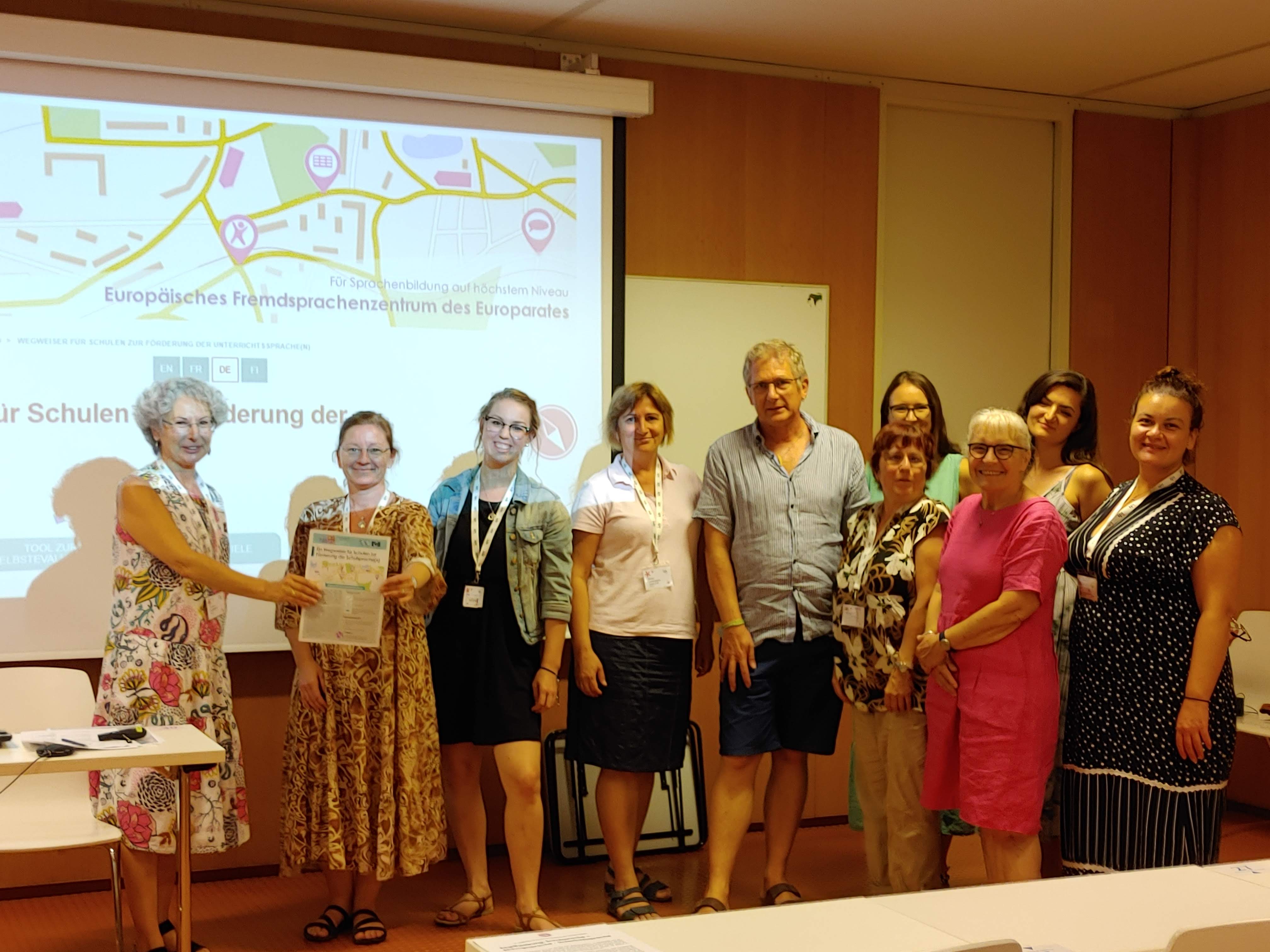
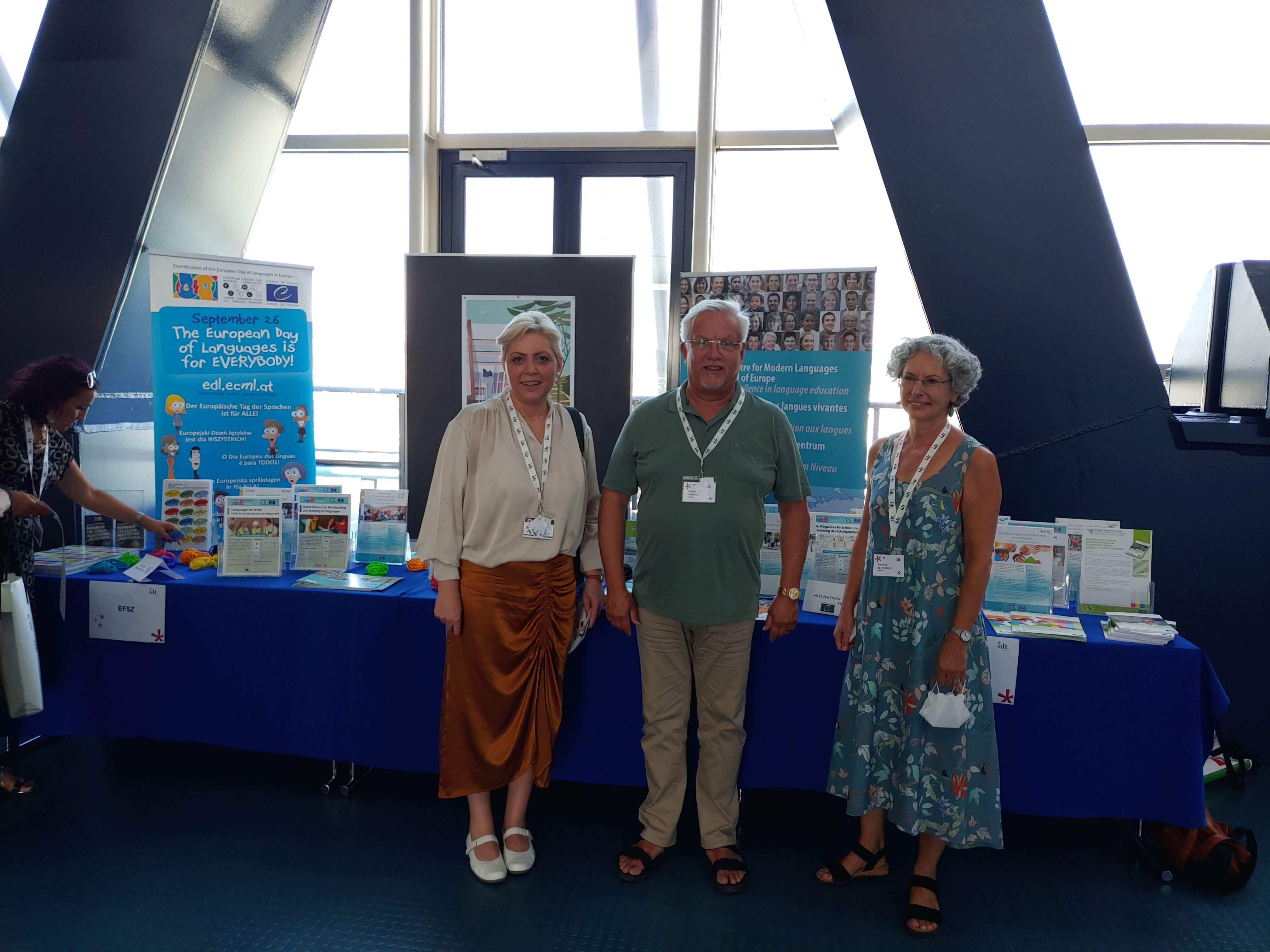
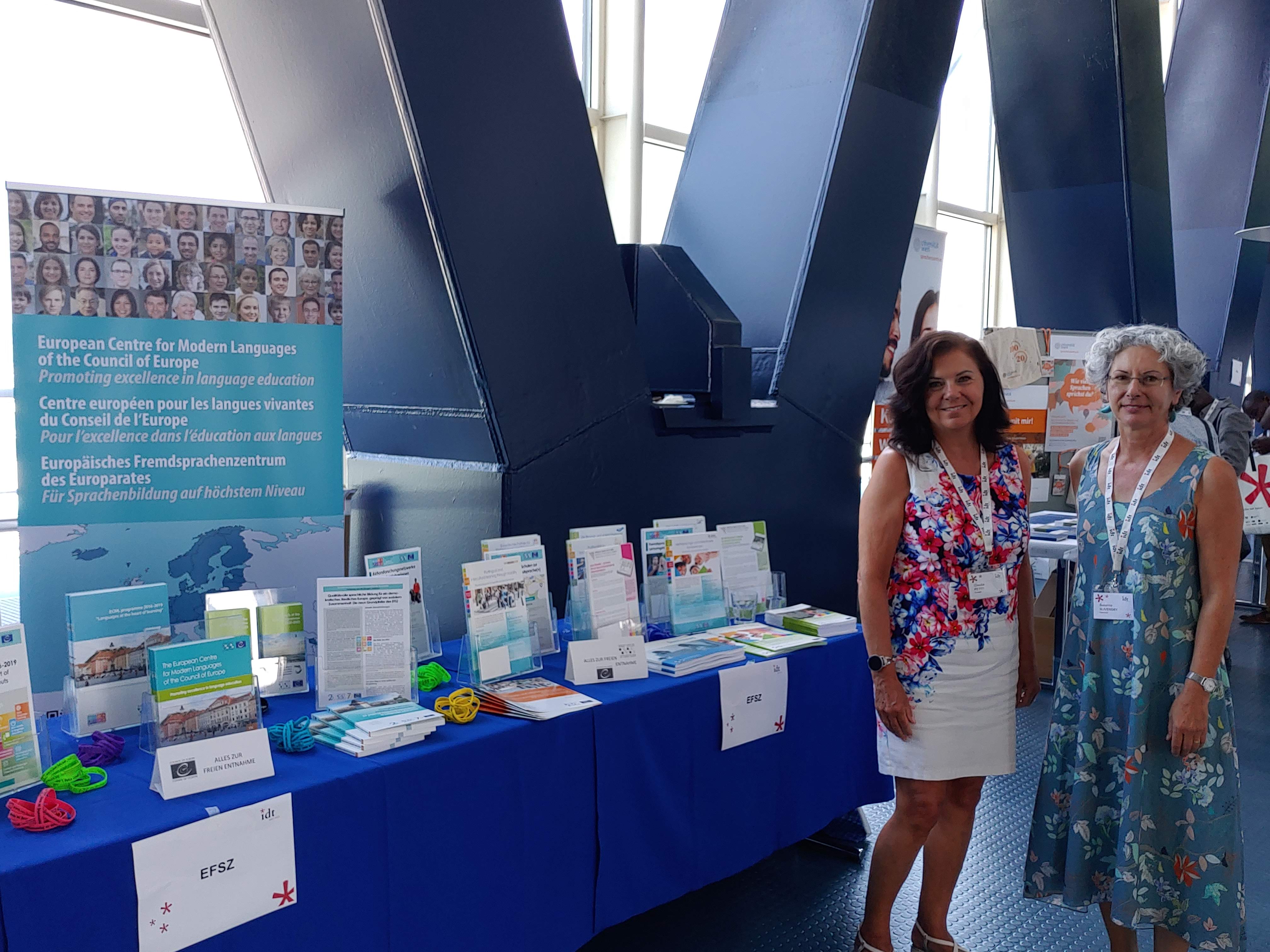
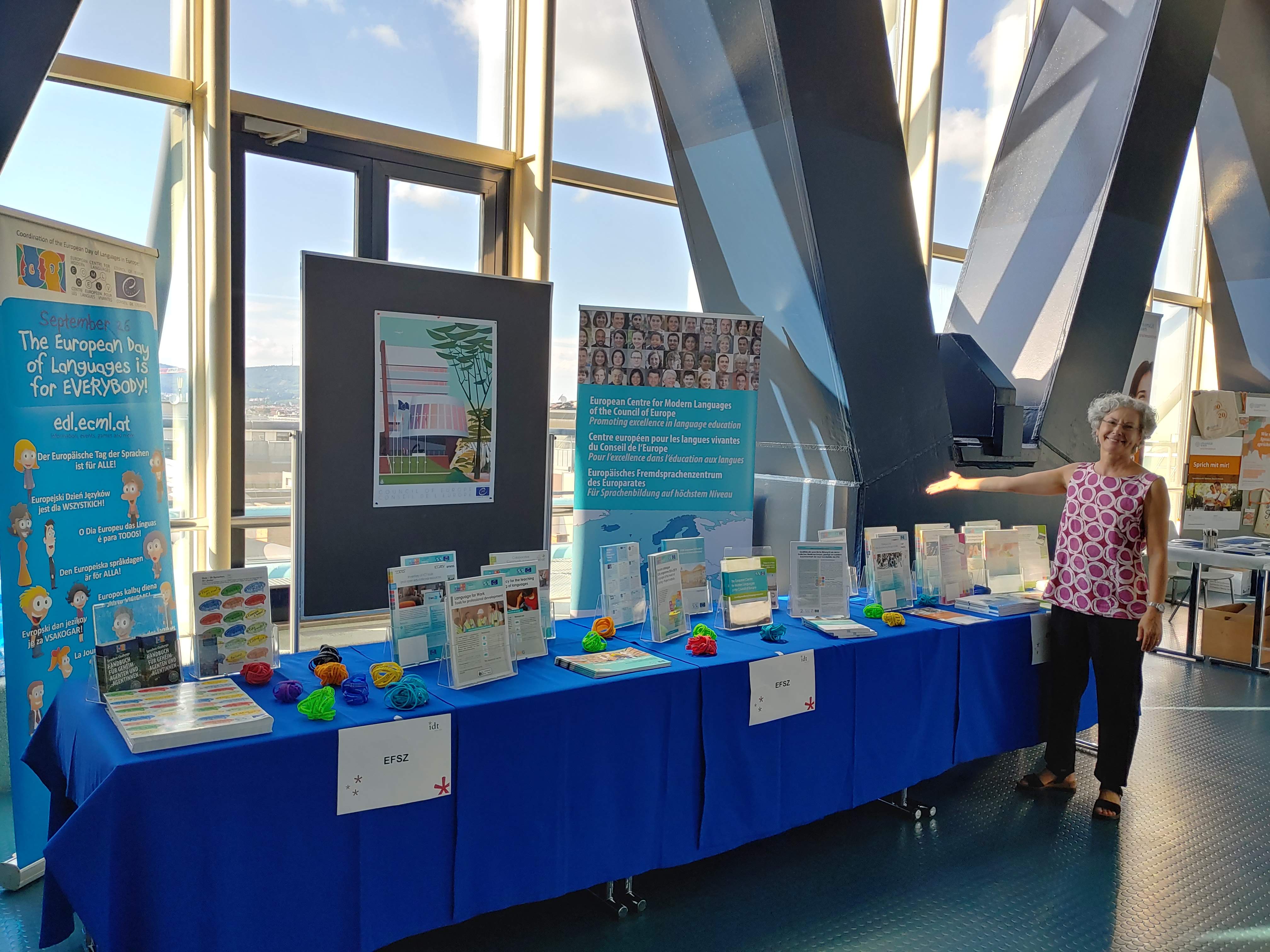
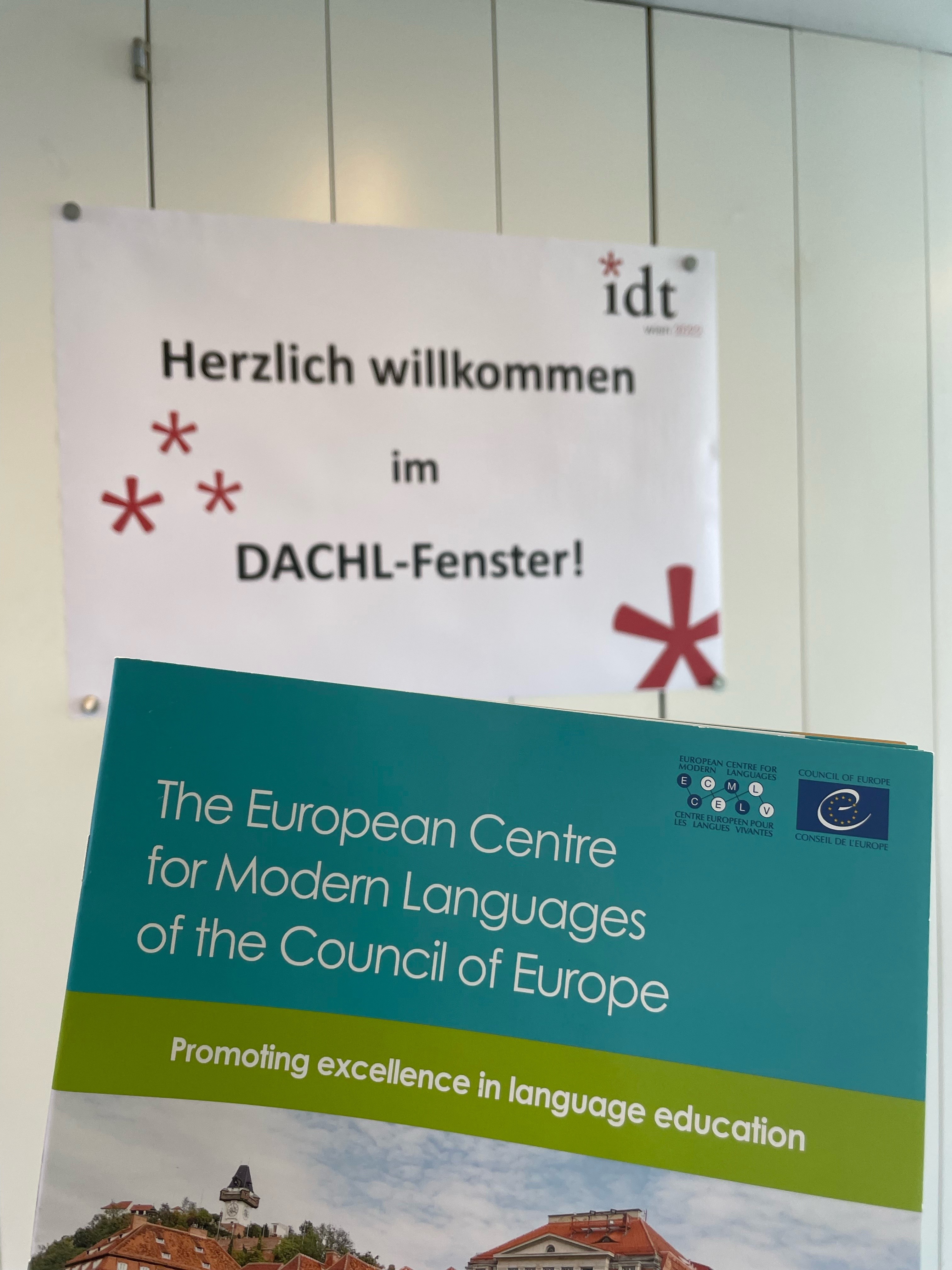

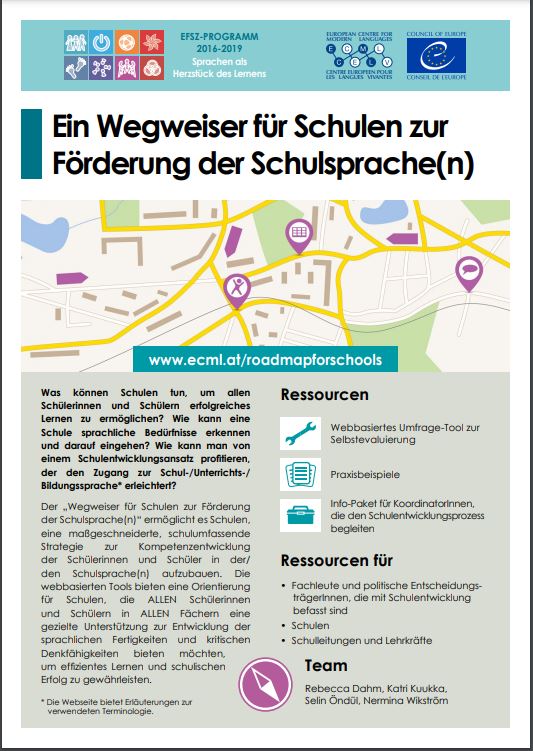
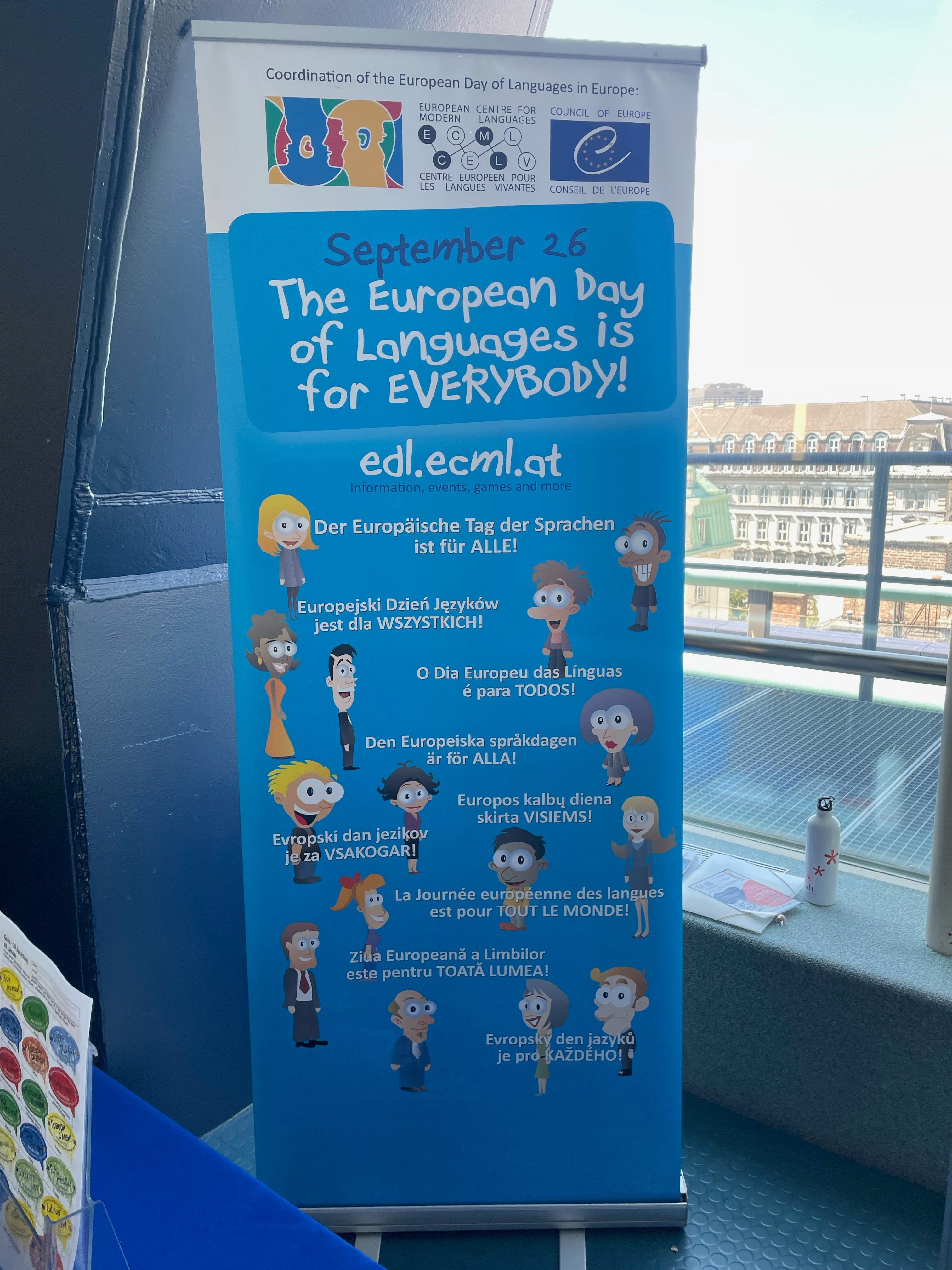
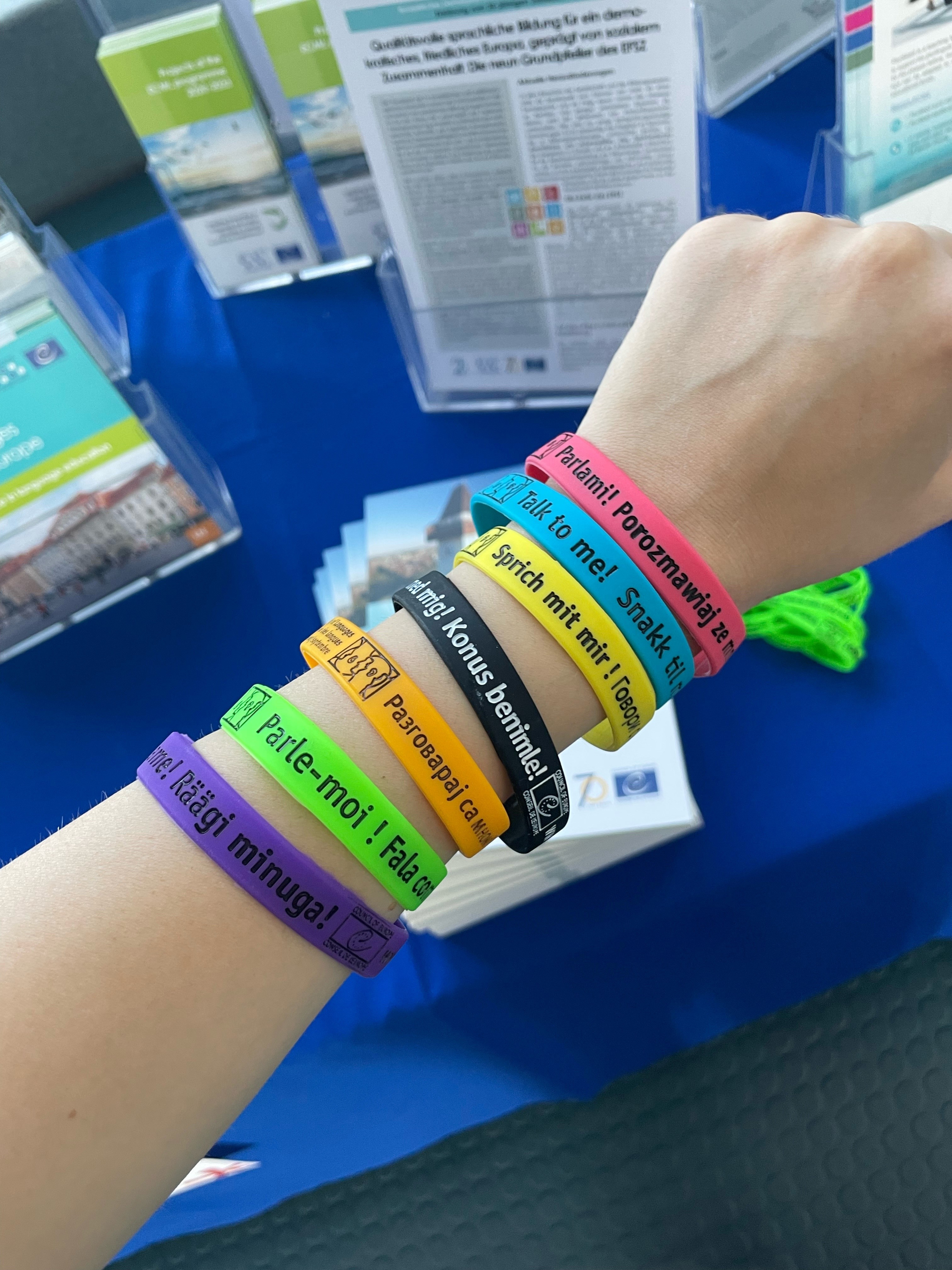
05.11.2021
Describing teaching competences in language education - Teacher educators from Austria and South Tyrol consult with European experts
Local organiser: Klaus-Börge Boeckmann, University College of Teacher Education (UCTE) Styria, Austria
ECML experts: Anna Schröder-Sura (University of Teacher Education St. Gallen, Switzerland / University of Rostock, Germany) and Lukas Bleichenbacher (University of Teacher Education St. Gallen, Switzerland)
Number of participants: 23 teacher educators, mainly from UCTEs in Austria, but also from South Tyrol
At this event, funded by the ECML and organised by the NCoC BIMM* in cooperation with the University of Teacher Education Styria, teacher educators, who are constantly faced with the task of describing the competences of teachers, e.g. when drawing up curricula or competence grids, were informed by Anna Schröder-Sura (University of Teacher Education St. Gallen/ University of Rostock) and Lukas Bleichenbacher (University of Teacher Education St. Gallen) about important results of the ECML project “Teacher competences for languages in education”. This project has gained important insights from the analysis of a large number of competence descriptions in the field of language education about how they are structured, which competences they contain and which system they follow. The participants were impressed by the variety of existing description models and extremely interested in the results of the analysis. The findings from this event were seen by them as valuable support for the creation of high-quality descriptions of teaching competences and will subsequently be integrated into the current and future curriculum revisions in the area of teacher education. The further development of national competence models such as the DaZKompP (German as a Second Language – Competence Profile for Teachers) will certainly also benefit from the information conveyed in this event.
* The NCoC BIMM (BIMM) is an Austria open network of universities of teacher education and experts and institutions which focuses on education in the context of migration and multilingualism.
Klaus-Börge Boeckmann, UCTE Styria, Graz, Austria
*****
Lehrkompetenzen in der sprachlichen Bildung beschreiben – Lehrerbildner*innen aus Österreich und Südtirol werden von europäischen Expert*innen beraten
Bei dieser vom EFSZ geförderten und vom NCoC BIMM in Kooperation mit der PH Steiermark durchgeführten Veranstaltung wurden die Lehrerbildner*innen, die immer wieder vor der Aufgabe stehen, die Kompetenzen von Lehrkräften zu beschreiben, z.B. bei der Erstellung von Studienplänen oder Kompetenzrastern, von Anna Schröder-Sura (PH St. Gallen/ Universität Rostock) und Lukas Bleichenbacher (PH St. Gallen) über wichtige Ergebnisse des EFSZ-Projekts „Teacher competences“ informiert. Dieses Projekt hat aus der Analyse einer Vielzahl von Kompetenzbeschreibungen im Bereich der sprachlichen Bildung wichtige Erkenntnisse darüber gewonnen, wie diese strukturiert sind, welche Kompetenzen sie enthalten und welche Systematik sie verfolgen. Die Teilnehmenden waren beeindruckt von der Vielfalt der bestehenden Beschreibungsmodellen und äußerst interessiert an den Ergebnissen der Analyse. Die Erkenntnisse aus dieser Veranstaltung wurden von ihnen als wertvolle Unterstützung für die Erstellung qualitativ hochwertiger Lehrkompetenzbeschreibungen gesehen und werden in der Folge in die aktuell laufenden bzw. in Zukunft anstehenden Studienplanüberarbeitungen im Bereich der Lehramtsstudien einfließen. Auch die Weiterentwicklung nationaler Kompetenzmodelle wie des DaZKompP (Deutsch als Zweitsprache – Kompetenzprofil für PädagogInnen) wird sicher von den in dieser Veranstaltung vermittelten Informationen profitieren.
Klaus-Börge Boeckmann, PH Steiermark, Österreich
05.11.2021
Supporting Multilingual Classrooms: ECML online national training workshop (14 – 15 October, Austria)
Local organiser: Gabriele Isak, PH Kärnten
ECML experts: Brigitte Gerber, Switzerland; Chantal Muller, Belgium
Participants: 19 (foreign language teachers, students in the teacher training programme, policymakers)
“Supporting Multilingual Classrooms offered excellent opportunities for raising awareness for the needs of multilingual learners, for developing plurilingual competences and for promoting a positive attitude to linguistic and cultural diversity. The practical examples, plurilingual activities, digital tools and intercultural approaches showed a variety of methods and materials that can actually be used in the classroom. The two very competent ECML representatives, Brigitte Gerber and Chantal Muller, gave insight into various ECML projects and materials, they provided links to the projects and created a detailed PowerPoint presentation and a Padlet with further information and activities that participants can also use in the future.
The participants (mainly university and college of education lecturers and students) were very interested in the materials, methods and approaches and took part actively in the activities. All in all, the workshop gave the participants a whole range of ideas, materials and approaches that they can put into practice in the classroom.”
Gabriele Isak, local organiser, 28 October 2021
ECML project website: Supporting multilingual classrooms – EU-ECML cooperation agreement 2020-2021 "Innovative methodologies and assessment in language learning"
05.03.2019
Preparing the 2019 series of ECML training and consultancy workshops in Austria, Bosnia and Herzegovina, Denmark, Greece, and Poland
The ECML expert team of the activity “A pluriliteracies approach to teaching for learning” discussed details of their 2019 training workshops with local organisers from Austria, Bosnia and Herzegovina, Denmark, Greece, and Poland at the ECML in Graz.
More information on the individual training sessions will soon be available on the dedicated website.
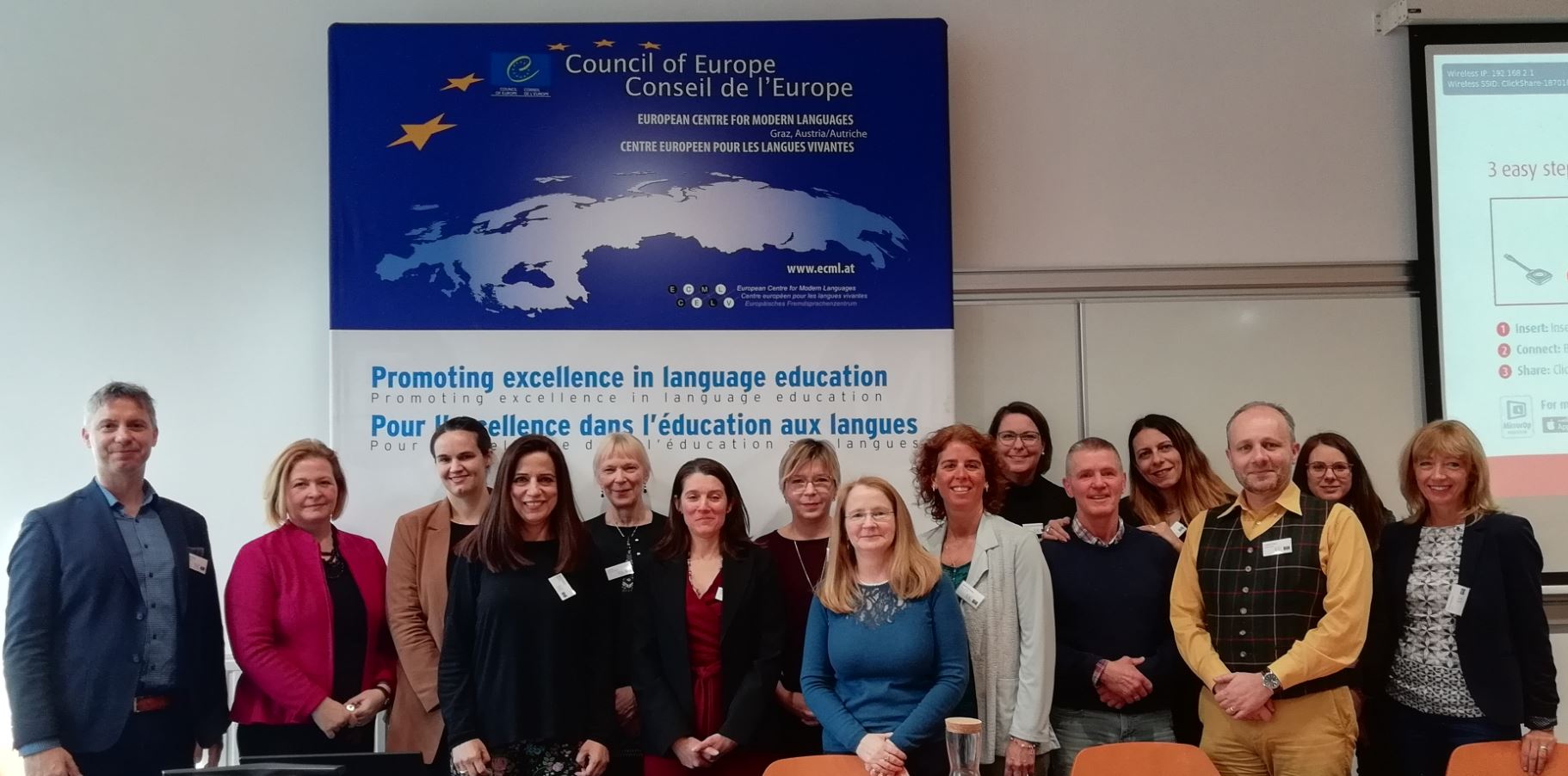
26.02.2019
SWITCH: Promoting diversity and plurilingualism
As the name suggests, the aim of the SWITCH-competition is to encourage the development of skills in switching between different languages.
The competition on 26 February was organised by the Province of Styria and the local school authorities and hosted at the European Centre for Modern Languages. Nearly 100 students between the ages of 16 and 18 from various Styrian secondary schools took part in this popular annual event in Graz in two categories
- The “language of schooling” category included students who have acquired their knowledge of the competition language in an Austrian school (or in a school in a non-English/French/Italian/Spanish/Russian speaking country); whose competition language was neither their mother tongue nor their cultural language; who have not attended a school in which this language is the main language of instruction, nor a bilingual school with this language as a second language; and who have not spent more than 2 months per school year (including holidays) in an environment in which the competition language is the national language or cultural language since they were 4 years old.
- The “Native Speaker” category encompassed all those persons who do not correspond to the first category and who have English as their language of schooling at their school.
In an interview situation with a panel of native speakers the students switched between English and a second language of their choice (French, Italian, Spanish, Russian). Examiners and the jury members evaluated them according to a series of criteria such as
- language used: scope and appropriateness of structures and vocabulary, flexibility and fluency, pronunciation;
- content: relevance, creativity and independence, coherence of generating ideas;
- social competence: initiative taking, responding to interlocutors, identification with a situation and a role.

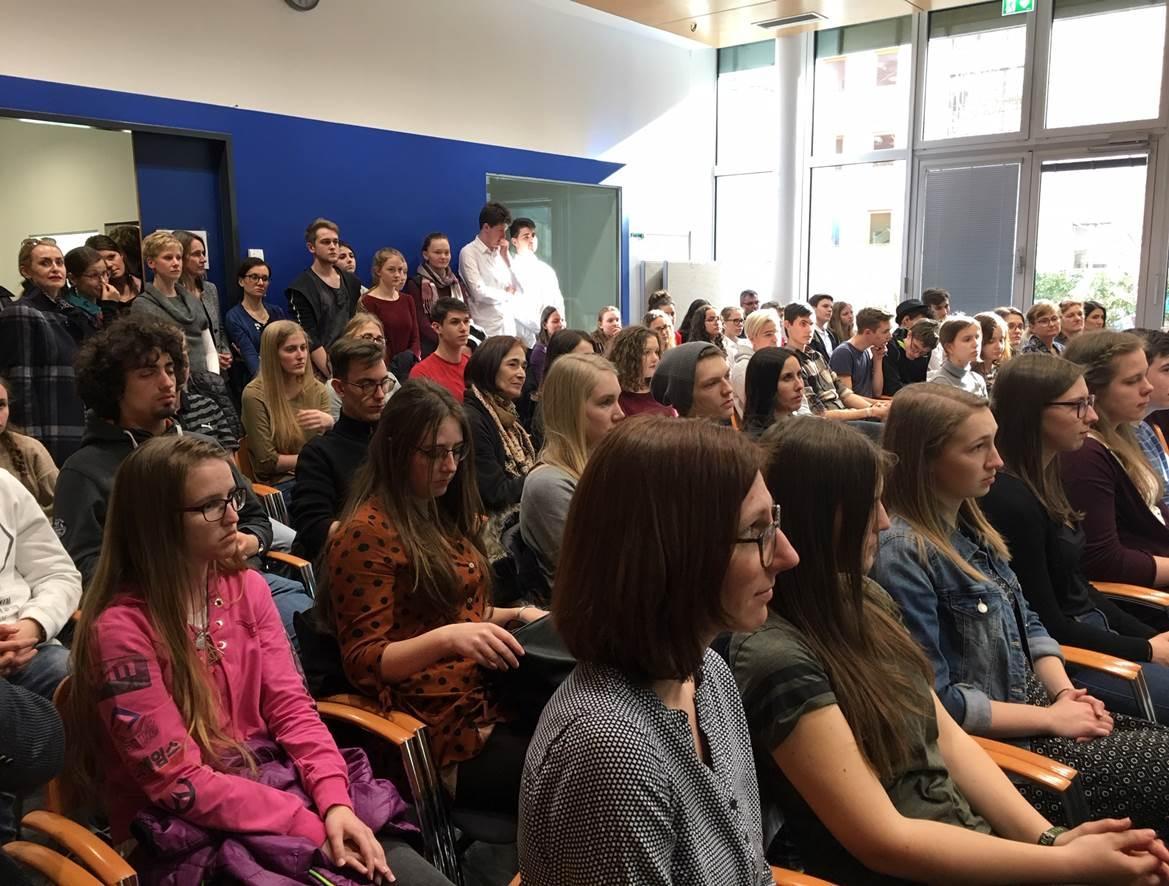
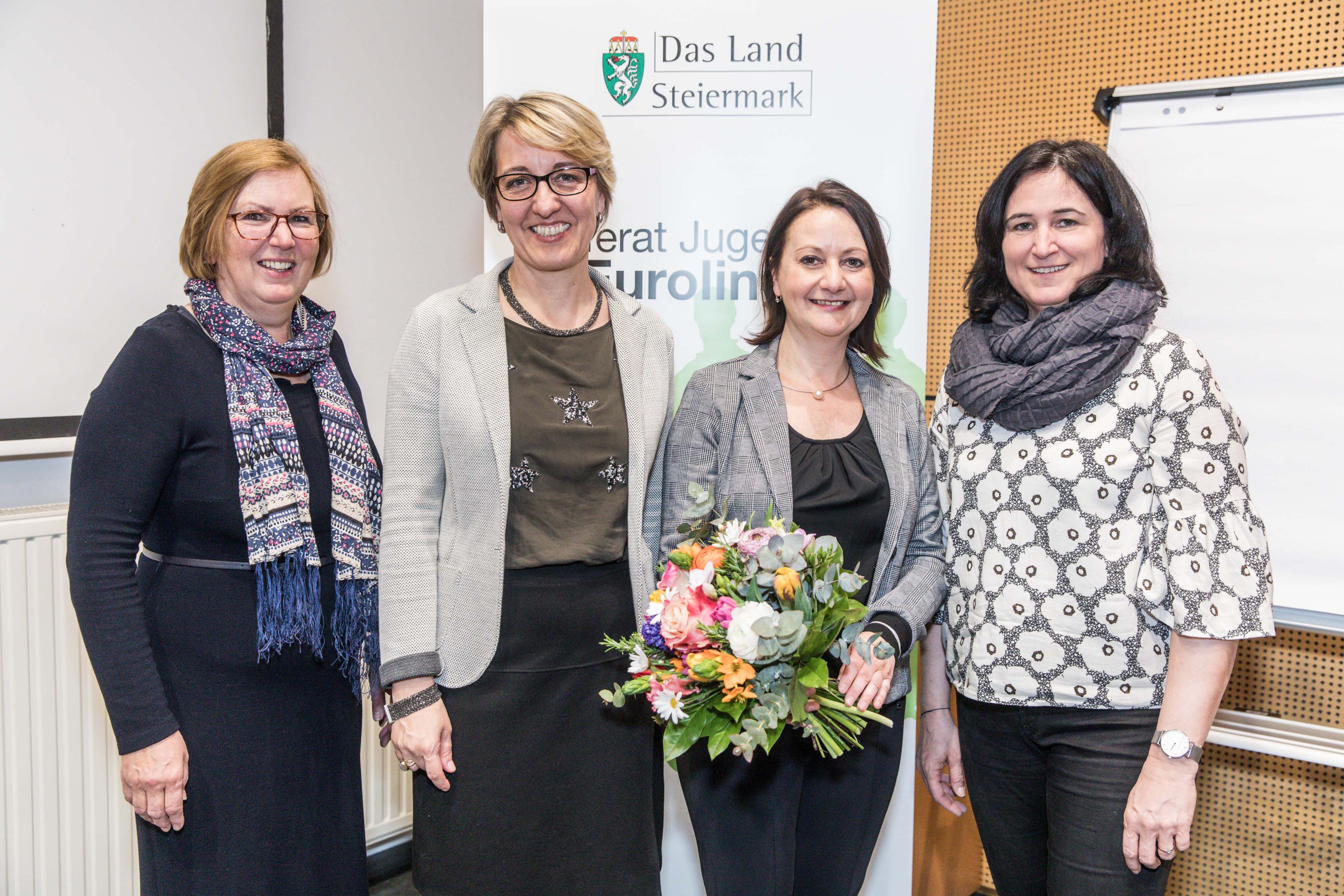
30.11.2018
Au revoir to Achim Braun, Field Officer of the EU representation in Vienna
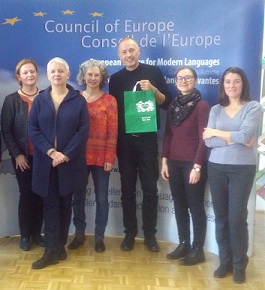 On Thursday, 29 November 2018 Achim Braun, Field Officer and liaison person for languages at the EU representation in Vienna, visited the ECML to say good-bye after 6 years of excellent cooperation with the ECML. Achim Braun returns to the European Commission in Brussels. His successor, Claudia Kropf, also used this occasion to familiarize herself with the work of the ECML and introduce herself to ECML staff. She emphasised that she will continue to foster good cooperation with the ECML, in particular with regard to the activities organized on the occasion of the European Day of Languages taking place every year on 26 September. ECML staff thanked Achim Braun for his open-minded approach to cooperation, wished him a good start in Brussels and welcomed Ms. Kropf as a new partner representing the EU in Vienna.
On Thursday, 29 November 2018 Achim Braun, Field Officer and liaison person for languages at the EU representation in Vienna, visited the ECML to say good-bye after 6 years of excellent cooperation with the ECML. Achim Braun returns to the European Commission in Brussels. His successor, Claudia Kropf, also used this occasion to familiarize herself with the work of the ECML and introduce herself to ECML staff. She emphasised that she will continue to foster good cooperation with the ECML, in particular with regard to the activities organized on the occasion of the European Day of Languages taking place every year on 26 September. ECML staff thanked Achim Braun for his open-minded approach to cooperation, wished him a good start in Brussels and welcomed Ms. Kropf as a new partner representing the EU in Vienna.
https://ec.europa.eu/austria
https://www.facebook.com/translatingforeurope/
27.09.2018
Happy European Day of Languages - Amazing language festival today in Graz!
This year the European Centre for Modern Languages of the Council of Europe has been again involved in organising today's 6th edition of the language festival.
The Graz Museum and its surrounding area have been transformed for the day into a language hub.
All age groups are invited to the festival which offers a wide range of activities highlighting the linguistic and cultural diversity of the city of Graz. The event features a lively mix of language workshops, games, quizzes and international theatre, music and dance.
Council of Europe Director General of democracy, Snežana Samardžić-Marković, has honoured us today with her presence and opening speech at the Graz Sprachenfest and her visit at the premises of the ECML.
We hope to attract over 2000 participants to the language festival this year!
First photo impressions of this exciting day
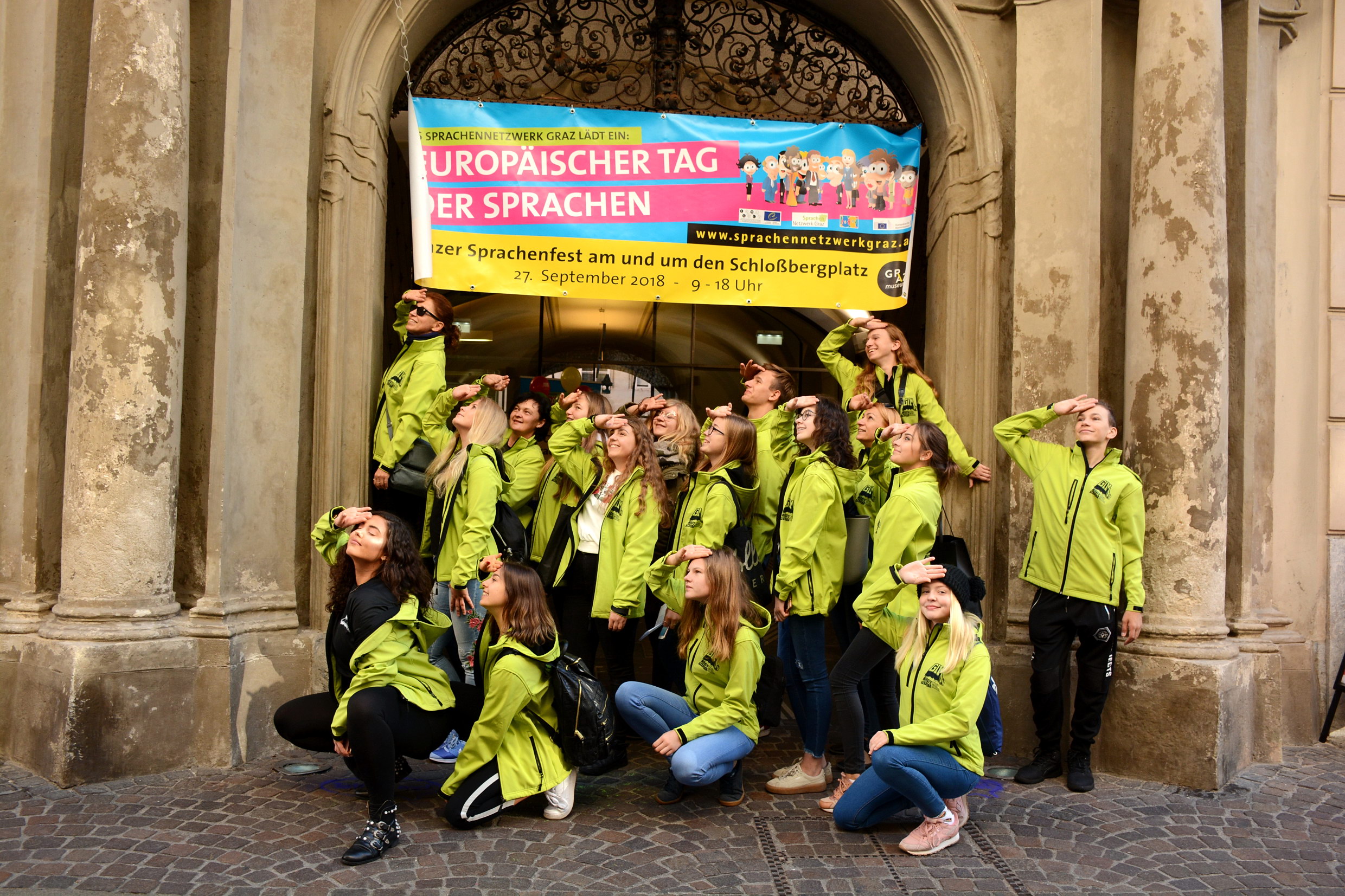
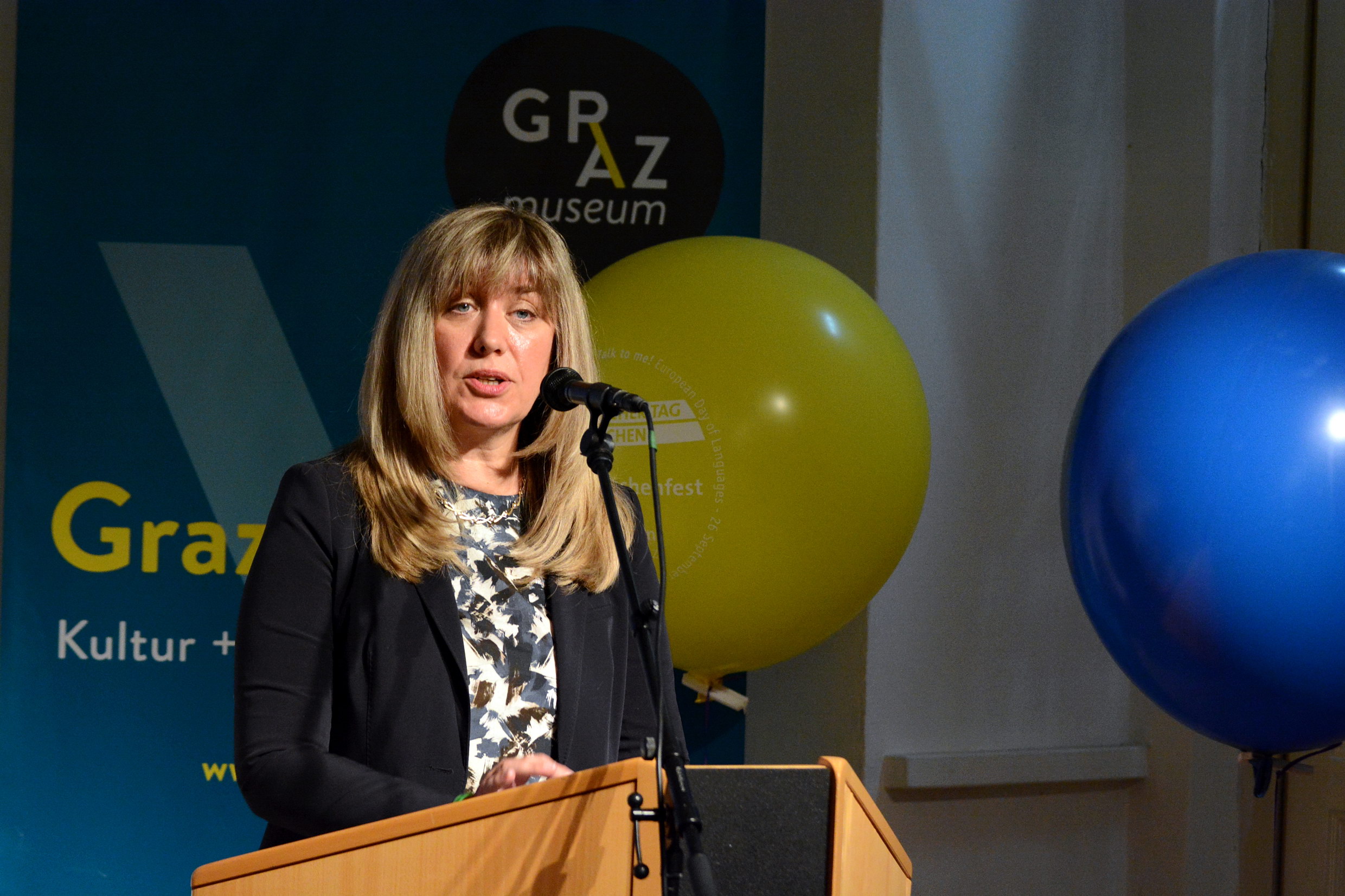
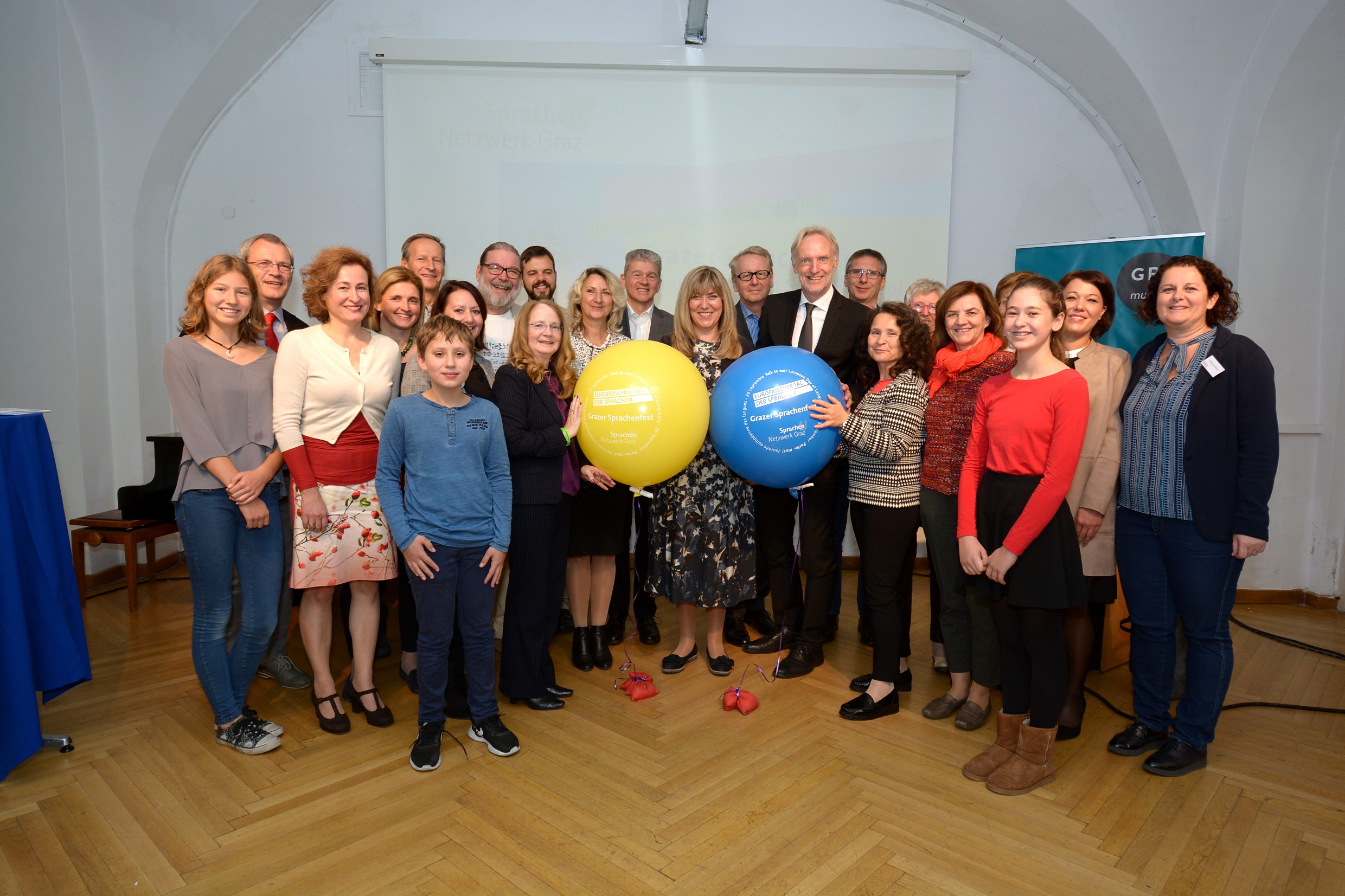
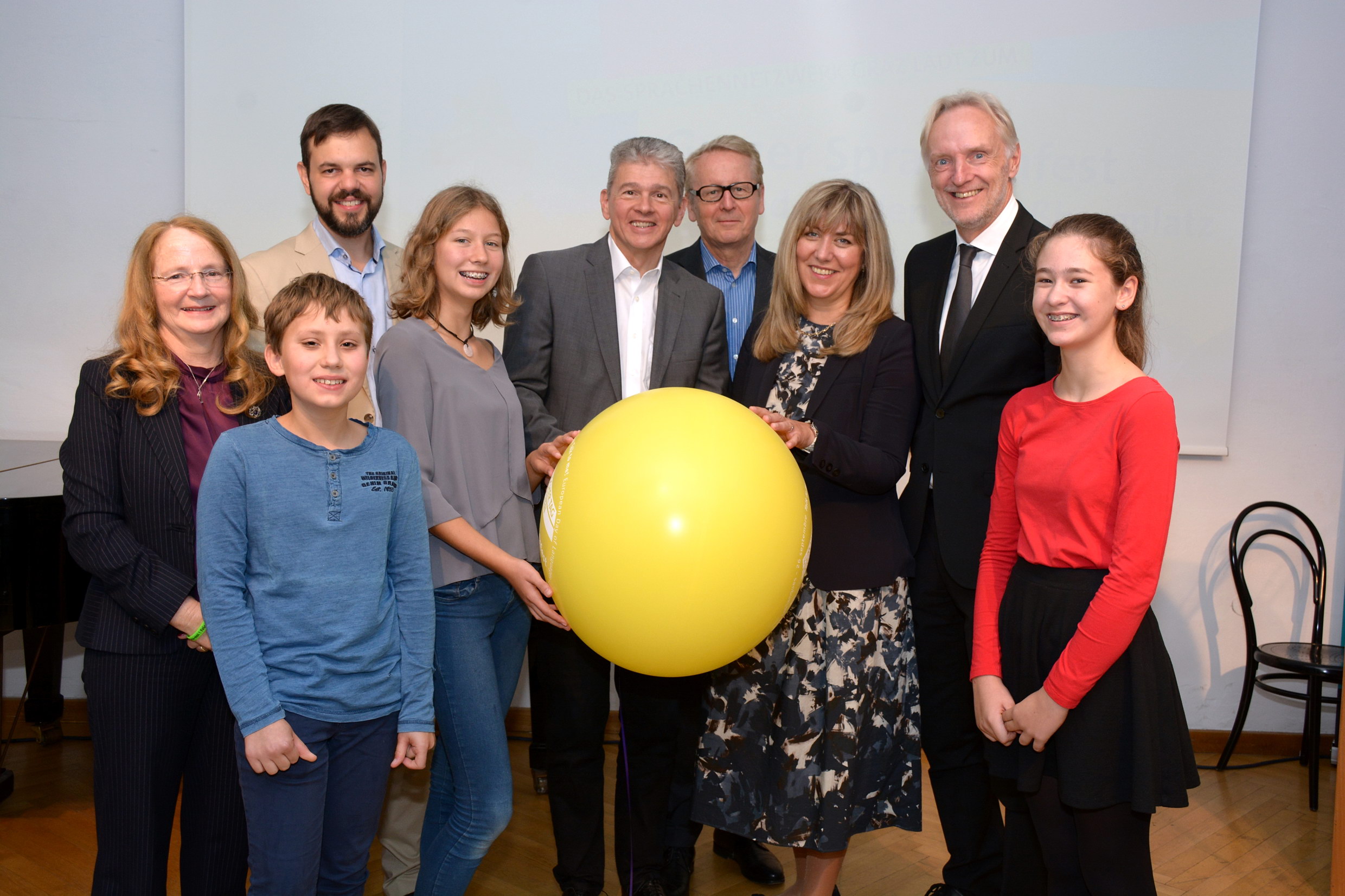
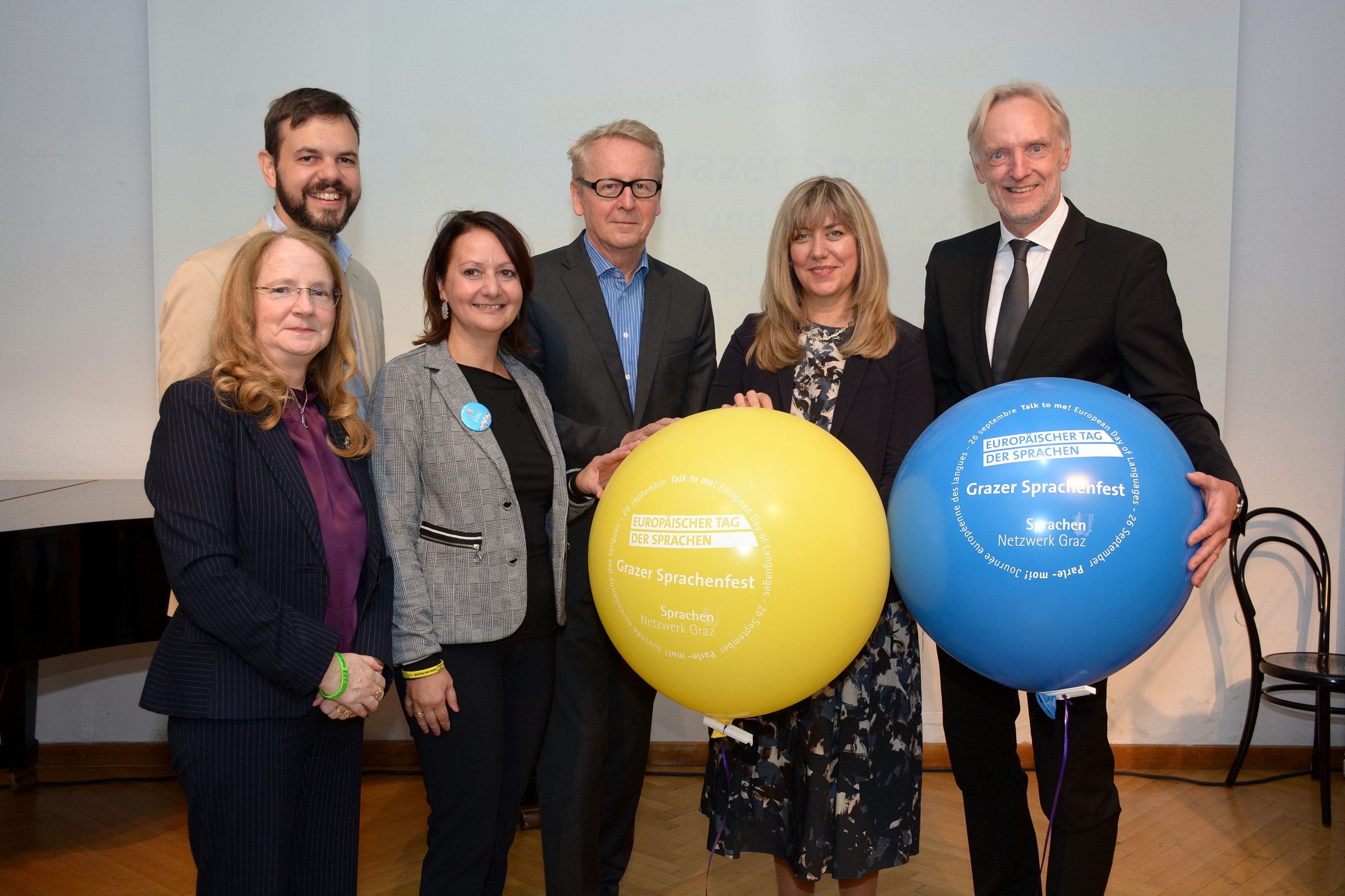
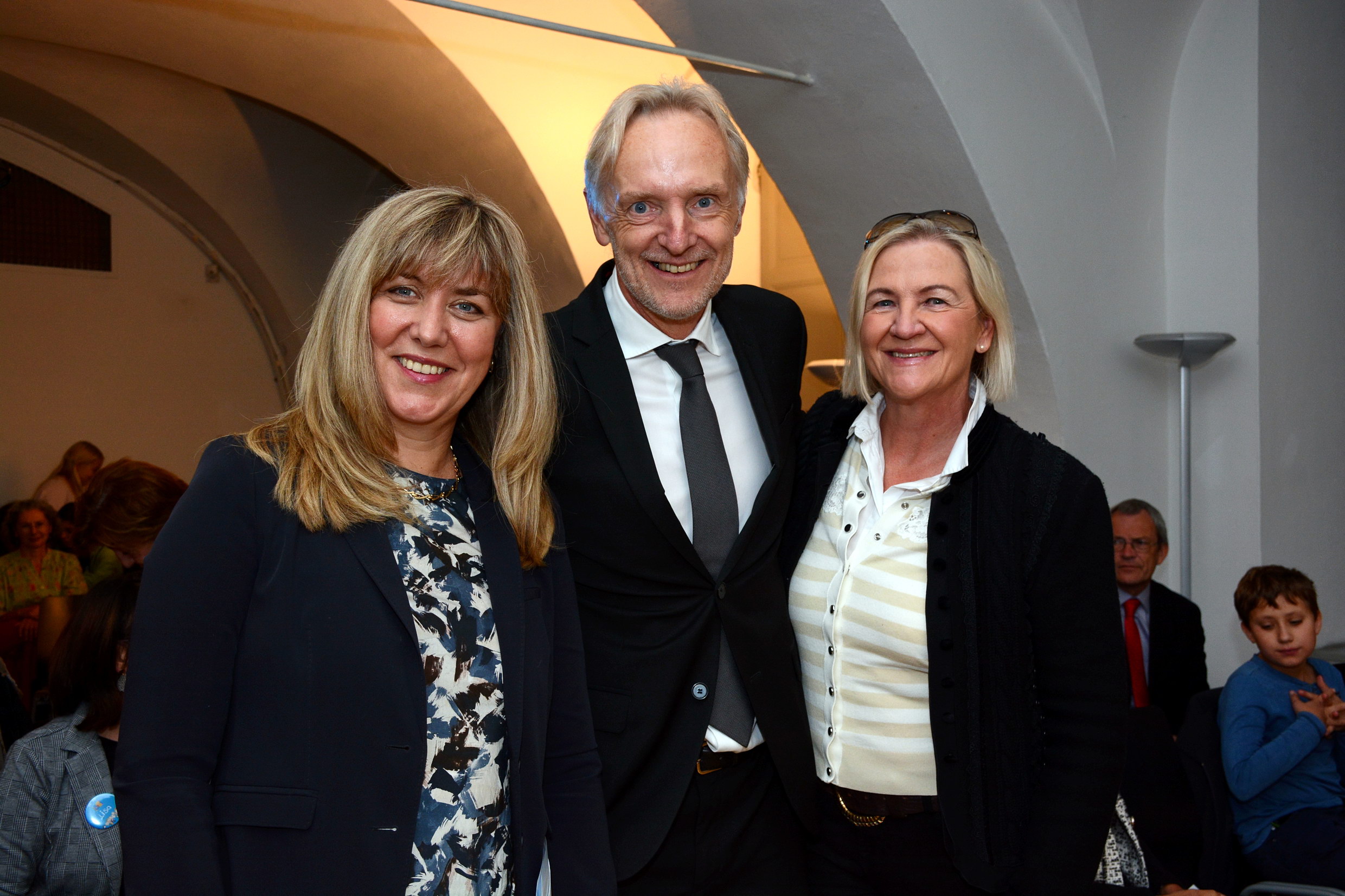
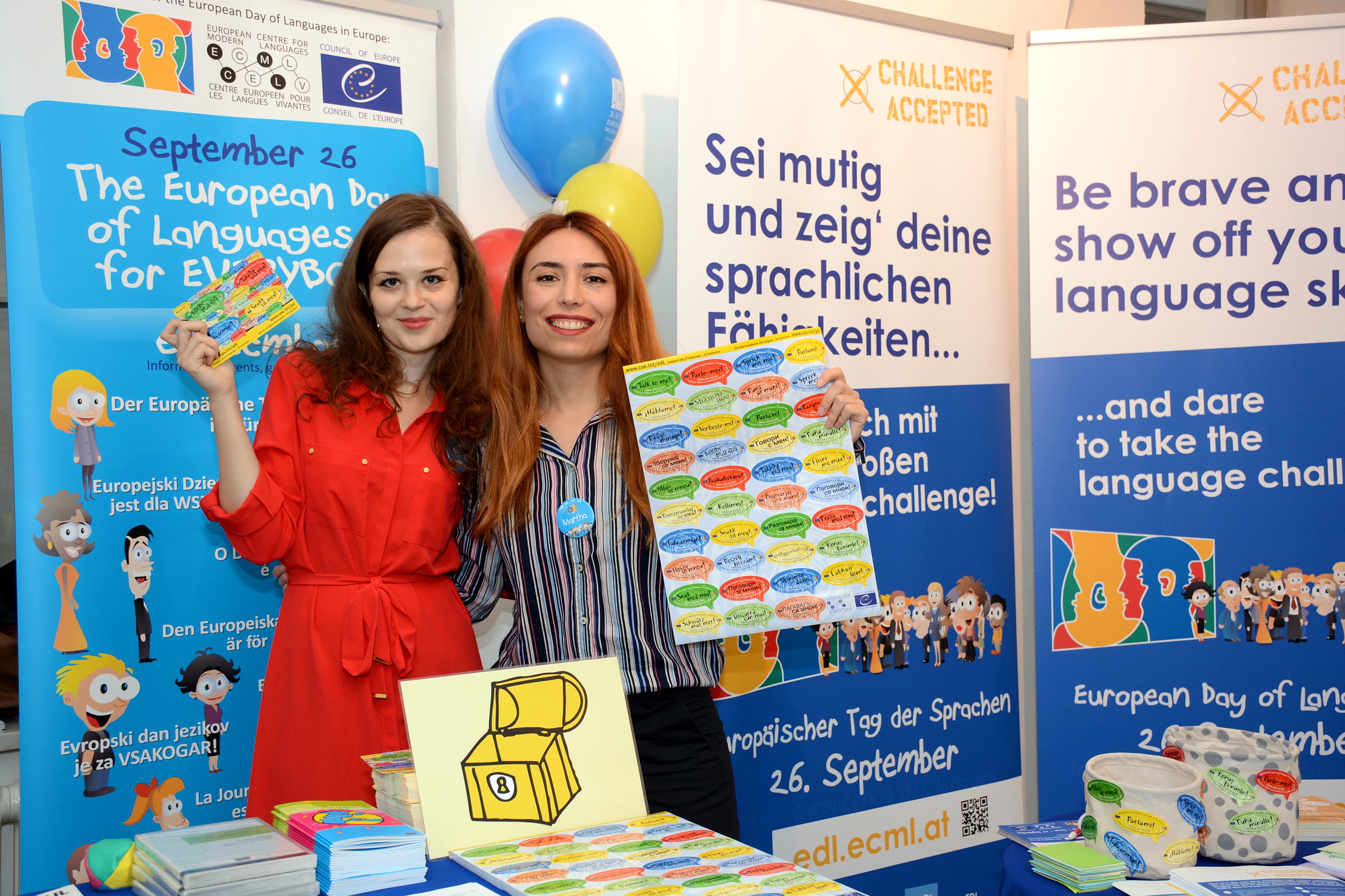
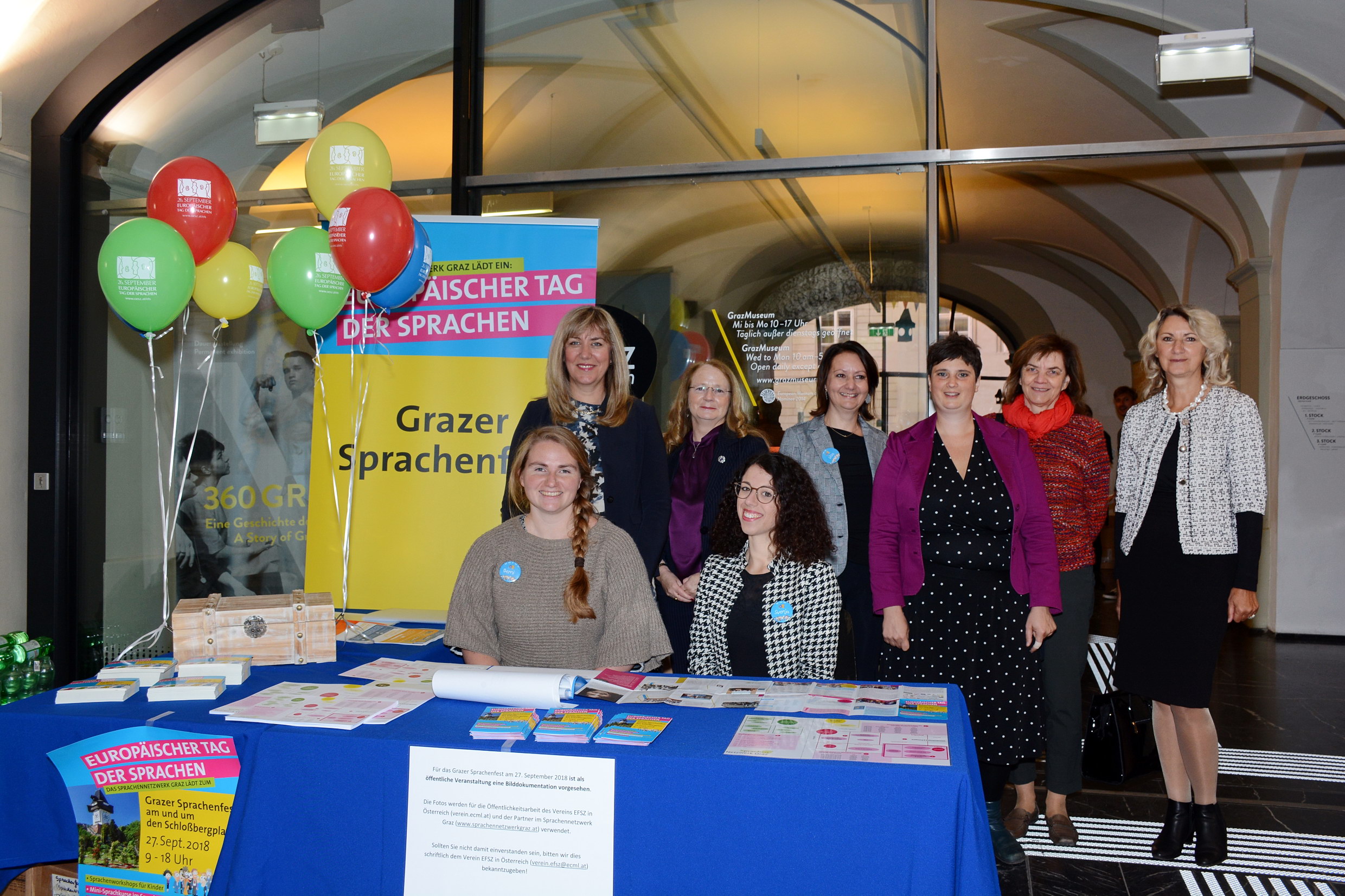
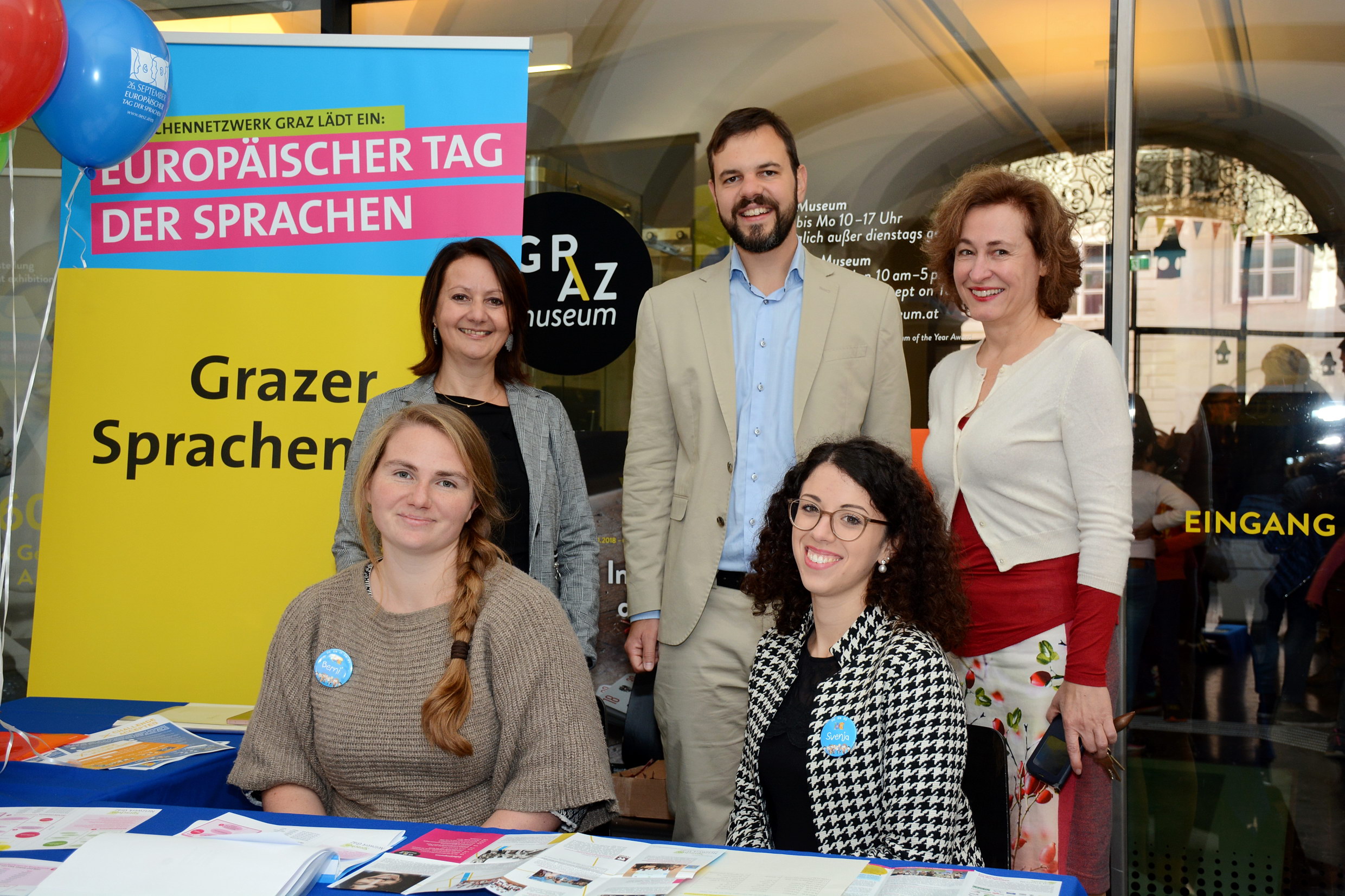
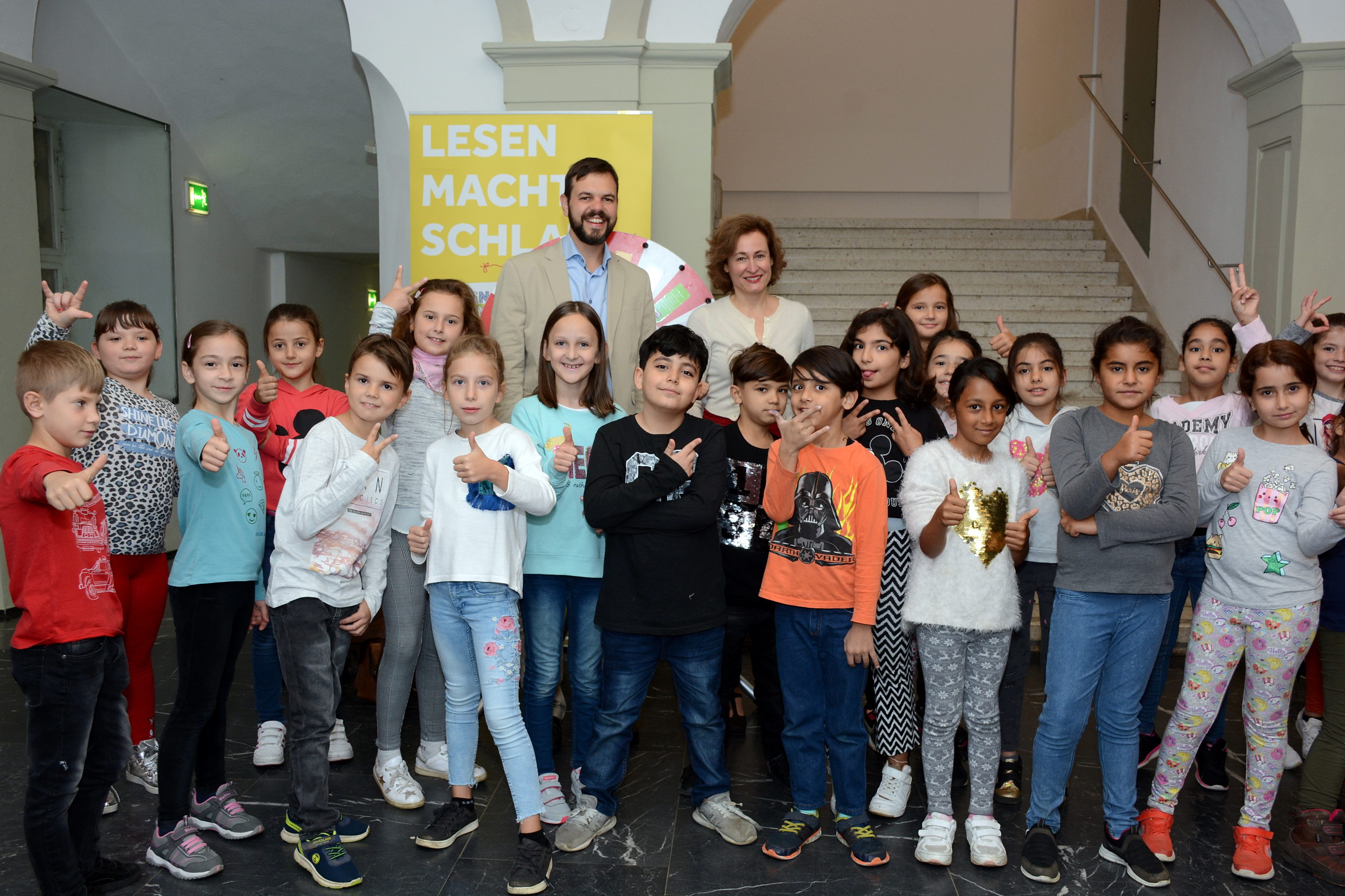
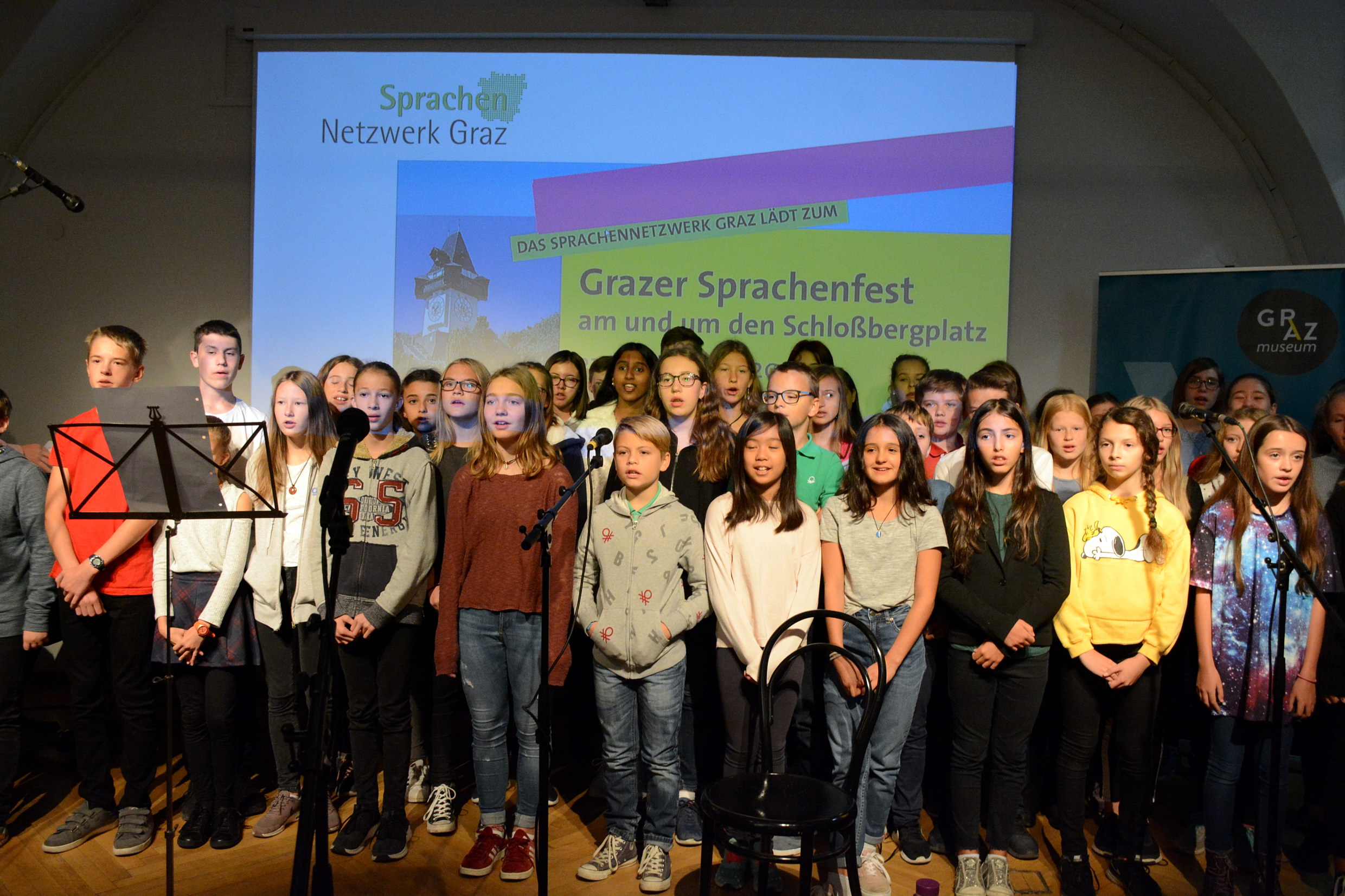
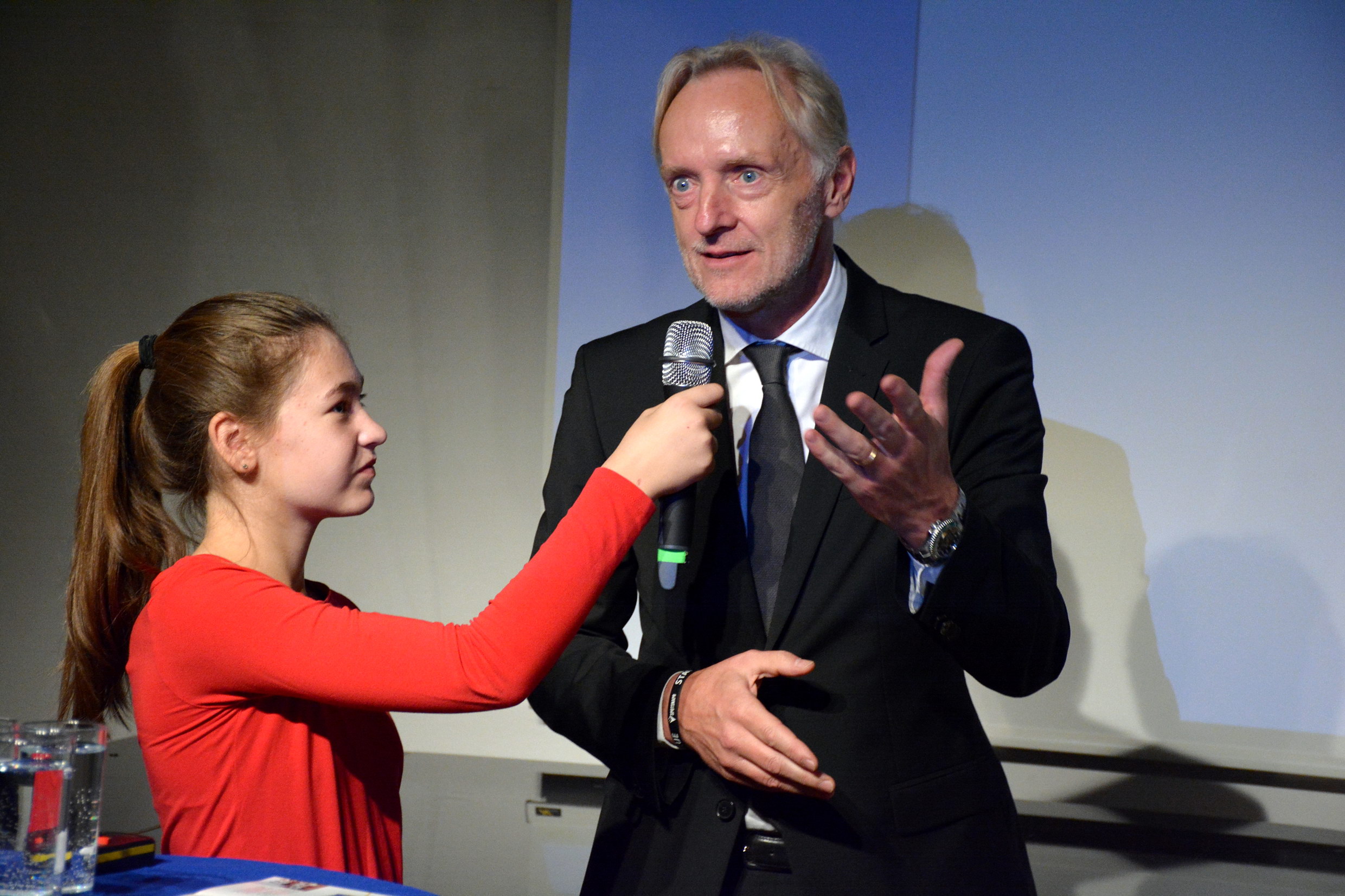
15.05.2018
“A pluriliteracies approach to teaching for learning” : ECML training and consultancy events planned in Armenia, Austria, Montenegro and Norway
ECML experts: Do Coyle, Kevin Schuck, Susanne Staschen-Dielmann, Fred Taveau
Experts invited by the coordinator: Dunja Chamberlain, Letizia Cinganotto
On 4 and 5 December 2017 the Pluriliteracies team met with national representatives from Armenia, Austria, Montenegro and Norway who had applied for an ECML training and consultancy event to be held in their respective countries.
The purpose of the meeting was to introduce the Pluriliteracies Framework for Deeper Learning to the national representatives, to find ways of adapting the content and methods of our training offer to the specific needs of the target countries and to schedule dates for the trainings to be held in 2018.
The meeting also gave our team the invaluable opportunity to discuss the latest developments of our model, especially the Revised Pluriliteracies Framework for Deeper Learning which was introduced in a number of recent publications and has already found its way into CLIL teacher training curricula e.g. in Germany (Berlin) and Finland. The team also seized the opportunity to share best practice dissemination activities based on previous training experience in the ECML member states and to improve the exchange of materials by establishing a digital platform.
Oliver Meyer,
former coordinator of the ECML training and consultancy offer
*****
German version
„Pluriliterales Lernen im Sachfach“ : Fortbildungs- und Beratungsangebot des EFSZ in Armenien, Montenegro, Norwegen und Österreich Netzwerktreffen (Graz, Österreich, 4.-5. Dezember 2017)
EFSZ-ExpertInnen: Do Coyle, Kevin Schuck, Susanne Staschen-Dielmann, Fred Taveau
Gastexpertinnen auf Einladung des Koordinators: Dunja Chamberlain, Letizia Cinganotto
Am 4.-5. Dezember 2018 traf sich das Pluriliteracies-Team mit VertreterInnen aus Armenien, Montenegro, Norwegen und Österreich, die sich für Lehrerfortbildungen im Rahmen des Fortbildungs- und Beratungsprogramms des Europäischen Fremdsprachenzentrums (EFSZ) beworben hatten.
Der Zweck des Treffens bestand darin, die Kontaktpersonen in den Bewerberländern und deren spezifische Situationen und Erfordernisse kennenzulernen, ihnen neue Entwicklungen in Bezug auf unser Pluriliterales Lehr-/Lernmodell vorzustellen und ein Fortbildungsangebot zu entwickeln, das auf die speziellen Bedürfnisse der Lehrenden in den jeweiligen Ländern zugeschnitten ist sowie konkrete Termine für die Fortbildungen zu vereinbaren.
Das Treffen war für uns auch eine wertvolle Gelegenheit, uns persönlich über Neuentwicklungen sowie aktuelle und geplante Veröffentlichungen der Teammitglieder auszutauschen. Die Relevanz unseres Modells zeigt sich unter anderem darin, dass es mittlerweile Einzug in Lehr- und Ausbildungspläne z.B. in Deutschland (Berlin) und Finnland gefunden hat.
Ein weiteres Ergebnis des Treffens bestand darin, dass sich die Teammitglieder über die bisher durchgeführten Fortbildungen ausgetauscht und best practice-Aktivitäten zusammengestellt haben, die nun allen Teammitgliedern auf einer internen digitalen Plattform zur Verfügung stehen.
Oliver Meyer, Koordinator
des Fortbildungs- und Beratungsangebot des EFSZ
*****
French version: available here
12.09.2017
Symposium celebrating the 10th anniversary of the Austrian Society for Languages Didactics: presentation of the project "Action research communities for language teachers"
On the 19 May 2017 Christine Lechner and Renata Scaratti-Zanin had the opportunity to attend the Symposium to celebrate the 10th anniversary of the Austrian Society for Languages Didactics and to present the ARC project ("Action research communities for language teachers") there. The lively and very intensive symposium hosted by the University of Vienna was attended by over 80 researchers, teachers and teacher educators as well as representatives from educational authorities and publishing houses from Austria, Germany, Italy and Hungary. The long abstract (*) on the ARC project (pp. 60-64) is included in the conference proceedings and describes the project framework, steps taken so far as well as the results from the workshop projects and ongoing developments.
(*) Available in German
Christine Lechner, project coordinator
05.05.2017
Recently published: European Language Gazette no. 36 (January-April 2017)
The European Language Gazette, the ECML's e-newsletter, provides up-to-date news about the ECML (events, projects, resources), the Language Policy Unit and other relevant sectors of the Council of Europe, as well as our partners. It focuses on national developments in the field of language education in the member states and beyond.
Read the latest issue: English - French
*****
Issue no. 36 – Contents
Focus on ECML programme developments – "Languages at the heart of learning" (2016-2019)
Latest project developments
"Language awareness in subject classes": participate in an online survey
"Towards a Common European Framework for Language Teachers": latest news
e-lang project in 2016: laying the foundations for a digital literacy in the language teaching and learning context
"Promoting excellence in sign language instruction (PRO-Sign2)": ECML workshop (Graz, Austria, 1-2 March 2017) – cooperation partnership with Moscow State Linguistic University
"A quality matrix for CEFR use": ECML workshop (Graz, Austria, 15-16 November 2016) – Interview with Denis Vigneron, French participant
ECML training and consultancy for member states
Network meeting of local organisers and ECML consultants (Graz, Austria, 7-8 March 2017) and upcoming national training workshops
National training workshop "Supporting multilingual classes" in Slovenia (Koper, 2-3 March 2017)
National workshops "A pluriliteracies approach to teaching for learning" in Malta (Floriana, 2-3 March 2017) and Latvia (Riga, 6-7 March 2017)
Forthcoming events
Recent ECML publication: Language skills for successful subject learning – CEFR linked descriptors for mathematics and history/civics
European Day of Languages
National developments in Armenia, Austria, Canada, France, Germany, Luxembourg, Malta, Poland, Slovenia, Switzerland
Professional Network Forum of the ECML: upcoming events
Council of Europe developments
The linguistic integration of adult migrants: some lessons from research
Council of Europe Ad hoc Committee of Experts on Roma and Traveller Issues (CAHROM) (ECML, Graz, Austria, 29-31 March 2017)
International Roma Day – 8 April
Pestalozzi programme: creating an online community of action researchers – summer school 2017
Framework Convention for the Protection of National Minorities: developments in Albania, Armenia, Azerbaijan, Bosnia and Herzegovina, Finland, Kosovo*, Lithuania, Moldova, Montenegro, Norway, Romania, Russian Federation, Slovenia, Sweden, Switzerland, Ukraine, United Kingdom, "The former Yugoslav Republic of Macedonia"
Urban policies for inclusive integration and diversity advantage: join the Intercultural Cities 2017 Milestone Event (Lisbon, Portugal, 28-29 November 2017)
Cyprus Chairmanship Conference in Nicosia: "Securing Democracy through Education"
Recent publication
Editorial news from other organisations: Eurostat, Eurydice, OECD, Unesco, Mercator European Research Centre on Multilingualism and Language Learning, Babylonia
Quick links
05.01.2017
Just published: European Language Gazette no. 35 (December 2016)
The ECML's e-newsletter provides up-to-date news about the ECML (events, projects, resources), its partners and other relevant sectors of the Council of Europe. It focuses on language education and national developments in the member states and beyond.
Enjoy the latest issue (December 2016) : English - French
29.11.2016
Workshop for teachers of German teachers - “Teaching about the culture of a target-country language in the language classroom: Austria” (Hermannstadt/Sibiu, Romania, 20-22 October 2016)
Members of the Action Research Communities for language teachers ran a workshop for teachers of German in Hermannstadt/Sibiu from 20th to 22nd of October, 2016. The aim was to introduce teachers to an action research way of thinking, to understand the benefits of action research for the enhancement of their classroom practice.
The content theme of the seminar was “Teaching about the culture of a target-country language in the language classroom: Austria”. The workshop opened with activities to exchange and compare knowledge, beliefs and opinions about Austria. The next stage was an analytic discourse based on posters made by the teachers to visualise a typical lesson on a cultural aspect in their German class.
The first day was concluded by general information about the “Action Research Communities for language teachers” and also by showing what the European Centre for Modern Languages (ECML) can offer to teachers of languages. It was important to ask for the participant feedback on what they had found interesting on the first day and what their hopes were for the continuation. Clearly, the teachers were keen to get concrete input that they could use at school. We were very pleased that they had found the exchange and getting to know each other professionally at some depth through the analytic discourse useful.
The second day opened with input on action research followed by an opportunity for the teachers to look at materials on Austria and approaches that they might use. They worked in groups moving from station to station. At the end of the second day, the teachers started to think about themes that they might work on and appropriate groups.
The third day opened with input on Learning Study as a co-operative form of action research and on an activity to generate shared visions for lessons on aspects of culture. The participating teachers planned in groups to hold lessons in their own classrooms and to write a joint report following individual experiences. The plans were shared through short presentations showing intentions and expectations.
We ended the workshop with a “crumple-paper” evaluation: “Lots of fun - using the methods presented will be worthwhile – we will carry on working together”.
03.11.2016
European Language Gazette : enjoy the latest issue!
The European Language Gazette, the ECML's e-newsletter, provides up-to-date news about the ECML (events, projects, resources), the Language Policy Unit and other relevant sectors of the Council of Europe, as well as our partners. It focuses on national developments in the field of language education in the member states and beyond.
Issue no. 33 (September - October 2016): available in English and in French.
22.06.2015
Graz in mourning
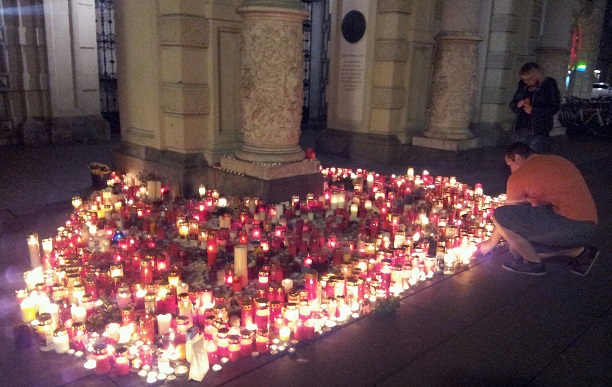 After the tragic events of Saturday afternoon, where three people died and many were seriously injured in the city centre of Graz, we would like to express our deepest sympathy to the victims and family members of all those who were caught up in a senseless act of violence.
After the tragic events of Saturday afternoon, where three people died and many were seriously injured in the city centre of Graz, we would like to express our deepest sympathy to the victims and family members of all those who were caught up in a senseless act of violence.
The series of attacks which started close to the ECML’s premises took place at one of the busiest times of the week and has shocked the population of a city known for its peaceful and welcoming character.
A
book of condolences has been opened by the Graz city authorities.
Joint declaration by the city government of Graz (in German, 22 June 2015)
19.05.2014
Austria - ÖSZ-Sprachbox: just released!